 29/03/2009 13:53 29/03/2009 13:53 |
|
| | | OFFLINE | | Post: 16.989 | Registrato il: 28/08/2005
| Utente Gold | |
|
OREMUS PRO PONTEFICE NOSTRO
The Holy Father requests the prayers of all the faithful so that the Lord may illumine the road for the Church. May the commitment of Pastors and the faithful grow, in support of the delicate and weighty mission of the Successor of the Apostle Peter as 'the guardian of unity' in the Church.
- Vatican Note, Feb. 4, 2009
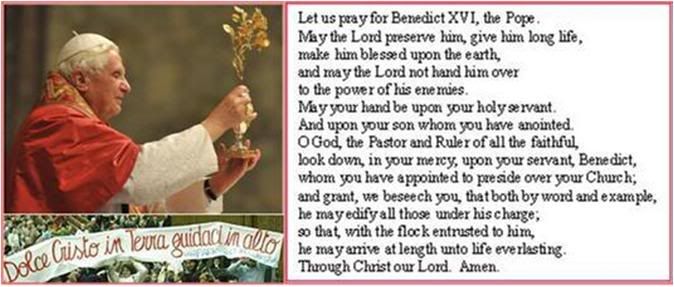

 The Pope's pastoral visit today:
The Pope's pastoral visit today:
The first Roman parish
dedicated to the Face of Jesus
by Gianluca Biccini
Translated from
the 3/29/08 issue of

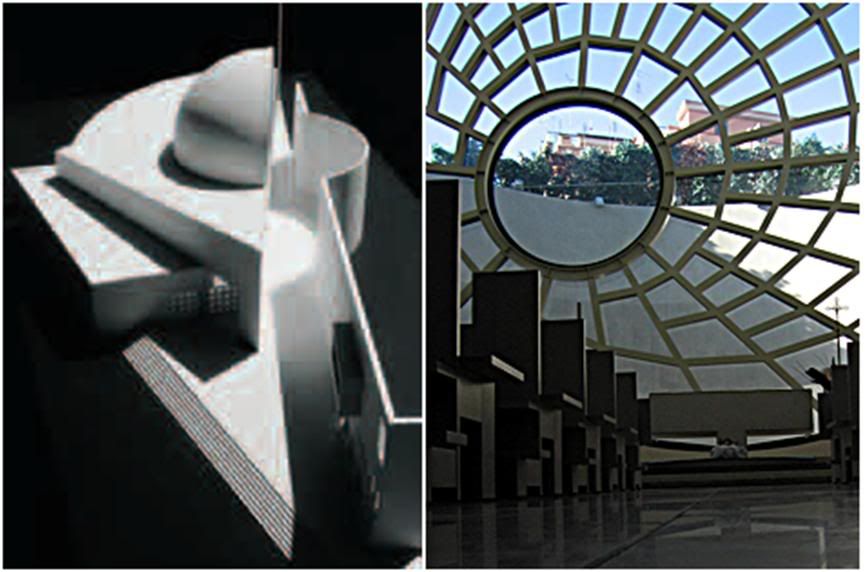
The white front courtyard of the Church of the Holy Face of Jesus in Rome's Magliana district has the shape of a great 'V' to symbolize open arms.
And it is with an embrace that the parish community of Via Ciprese intends to welcome Benedict XVI today on a pastoral visit. He is expected to arrive there around 9, and a giant screen has been set up in the adjoining plaza to allow everyone to follow the Mass to be celebrated by the Pope. The church, built on an old property of the state power company ENEL, only has 250 seats.
Since Christmas Eve, when parish priest Don Luigi Coluzzi announced the news, the community has been preparing for this meeting.
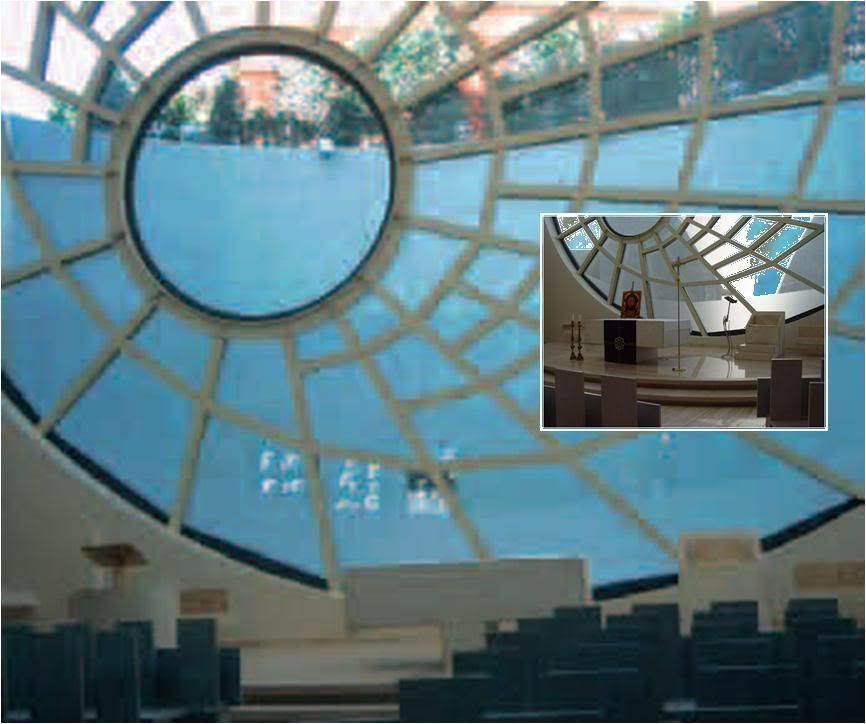
It is the eighth Roman parish which the Pope has visited since the start of his Pontificate. The first, on December 18, 2005, was to Santa Maria Consolatrice at Casal Bertone, which had been Cardinal Joseph Ratzinger's first titular church; and the most recent one was that to San Lorenzo al Verano in late 2008.
Returning from his trip to Africa, the Bishop of Rome is now visiting the southwest quadrant of the Diocese of Rome, among people who, in he course of years, were able to change the image of the neighborhood from one that had been too much associated with the so-called Magliana street gangs.
"That era," says Don Galuzzi, "is gone. Today, life in general is quiet, and the parish church, besides being a place of prayer, has also become a space for socializing, a reference point for the district".
Passing through Via della Magliana Nuova, the complex with its curvilinear forms, stands out in its entirety, including the great cross that looms behind it.
"The semicircular form," says Don Coluzzi, "contributes to create an atmosphere of contemplation. The large rose window allows the sun to come in, and so, the celebrations are filled with light [unless it's raining]".
For the principal architect of the church, Sartogo, church means welcome. And so he designed it like two arms opening towards the city and converging towards the Cross. The churchyard is like a street which also leads to the Cross.
Inside, above the altar, a glass half-dome allows the light to come in from above. In the area of the Cross, there is a small garden and a playground, often used by the children of the neighborhood, which does not have enough spaces for social gathering.
Born in 1978 as a subsidiary to the parish of St. Gregory the Great, the parish was originally dedicated to the Polish Franciscan who was martyred in Auschwitz, Fr. Maximilian Kolbe. The first church was built in 1992.
On May 27, 2001, it became the first Roman parish dedicated to the Holy Face of Jesus, in response to a call by John Paul II, who in the apostolic Letter Novo millennio ineunte, to mark the end of the Jubilee Year 2000, wrote: "Our testimony would be insufferably poor if we are not the first to contemplate on the Face of Jesus" (No, 16).
it was Cardinal Fiorenzo Angelini - promoter of international conferences on the Face of Faces - who presided over the life of the parish since its birth and who blessed the cornerstone for the new church on March 19, 2002.
Don Luigi has been parish priest since 1992 for this parish of 15,000 residents (representing some 4,500 nuclear families).
Initially, he had to carry on pastoral activities in places that had originally been stores.
"It was a sidewalk ministry," he jokes now. "but as the walls of the new complex started to rise, then so did the 'living stones' of the community increase in number. From the 100 persons that had first gathered in our old chapel, we now have at least 20 times more each Sunday."
Exactly three years ago today, it was Cardinal Camillo Ruini, then the Pope's vicar in Rome, who celebrated the dedication rites and Mass at the new church.
Today, the community that welcomes Benedict XVI includes seven large organizations, including the Milizia dell'Immacolata, a Padre Pio prayer group, the Risen Jesus association, three Neo-Catechumenal groups, five Gospel reading groups, the parochial Caritas and the local chapter of the Sant'Egidio community.
Recently formed is an association for newlyweds who, under the guidance of the parish priest himself, continue the formation they begin in the parish's pre-matrimonial courses.
"After the war in the ex-Yugoslavia," recalls Don Coluzzi, "we sent volunteers to do humanitarian work in Bosnia for three years".
His young vicar, Don Stefano Peri, 32, also calls attention to the parish's blood collection center, with a pool of 150 screened donors.
So many signs of vitality are confirmed even in vocations. "One of our own new priests is now vicar at Trionfale," says Don Coluzzi," and we will have another priest ordained on May 3. I saw them both grow up, adn now they are among the most beautiful gifts that we can offer the Holy Father."
Additional photographhs, thanks to benedetto.fan, who shot a great photo series as well as videos
(see PICTURES&VIDEOS thread) she took on her most recent trip to Rome:

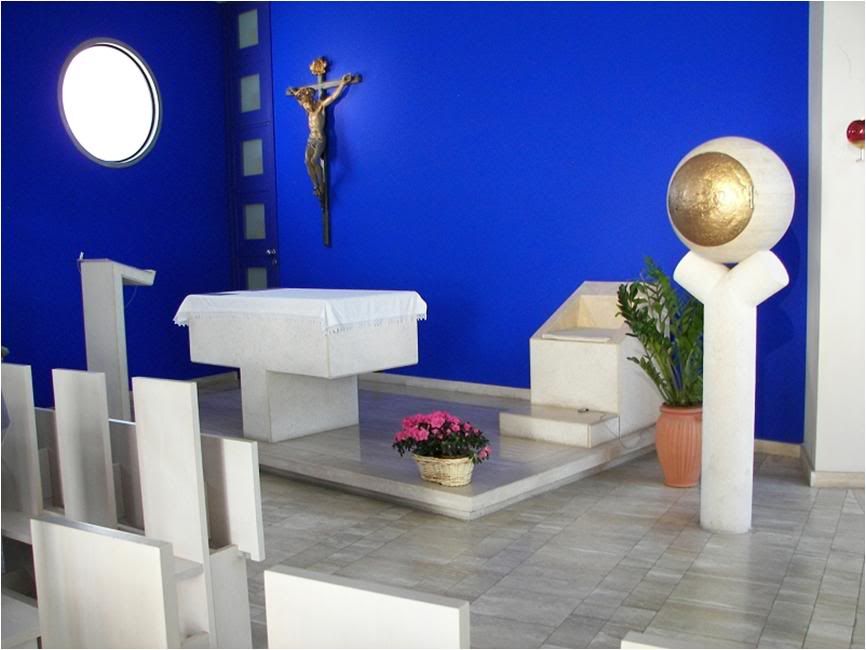
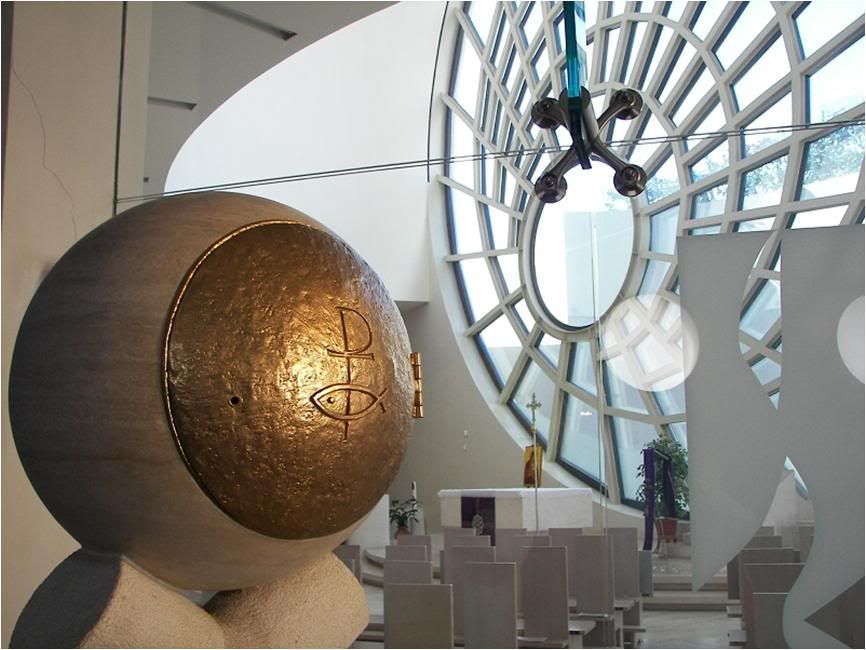 Structure in the foreground, above, is the Tabernacle.
Structure in the foreground, above, is the Tabernacle.
NB: According to an Avvenire story, Santo Volto was one of the Roman parishes that John Paul II was unable to visit during his 27-year Pontificate.
[Modificato da TERESA BENEDETTA 29/03/2009 22:54] |
|
 29/03/2009 13:54 29/03/2009 13:54 |
|
| | | OFFLINE | | Post: 16.990 | Registrato il: 28/08/2005
| Utente Gold | |
|


March 29
 Blessed Ludovico of Casorla (1814-1885)
Blessed Ludovico of Casorla (1814-1885)
Franciscan, Founder of the Gray Brothers
and Gray Sisters of St. Elizabeth
OR today.
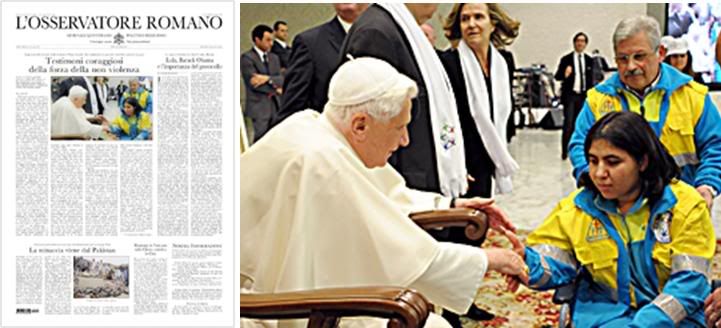
The Pope tells the youth volunteers for the Italian civil service
that fighting poverty means building the peace:
'Courageous witnesses to the strength of non-violence'
Other Page 1 stories: The Vatican meeting of teh Pope's Commission on China; the meeting in Washington between President
Obama and the President of Brazil; Pakistan-based enemy attacks a NATO base in northwest Afghanistan.
THE POPE'S DAY
Pastoral visit and Mass, Parish Church of Santo Volto di Gesu,
in Rome's Magliana district
Noontime Angelus, St. Peter's Square.
|
 29/03/2009 14:53 29/03/2009 14:53 |
|
| | | OFFLINE | | Post: 16.991 | Registrato il: 28/08/2005
| Utente Gold | |
|
 PASTORAL VISIT AND MASS,
PASTORAL VISIT AND MASS,
CHURCH OF SANTO VOLTO DI GESU
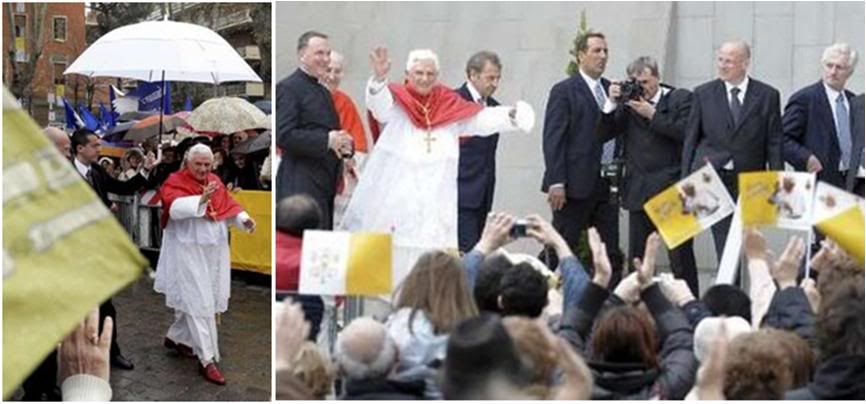
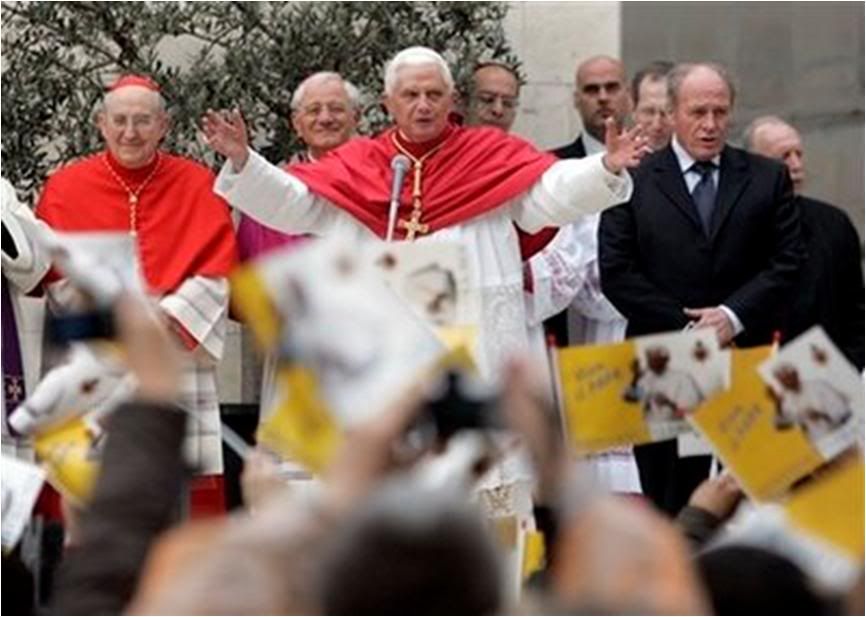
On arriving at the Church of The Santo Volto di Gesu this morning, the Holy Father addressed a few words extemporaneously to those who welcomed him: Here is a translation, from the transcript of Vatican Radio's Italian service:
Dear brothers and sisters,
Welcome on this beautiful Sunday. Unfortunately, it is raining, but the sun is coming out. This may be a sign of this pre-Easter season, during which we feel the pain of the Lord along with all the problems of the world today, each of us in his own way.
But we also know that the sun, although it may be hidden most of the time, does exist, that God is near and is with us. Therefore in this sense, let us proceed towards Easter, knowing that suffering and difficulty form part of life, but also knowing that behind the sun is Divine goodness.
So I greet you all from the heart. Thank you for your presence. I wish everyone a good Sunday, to everyone in this beautiful parish.
All my best wishes, and thank you!
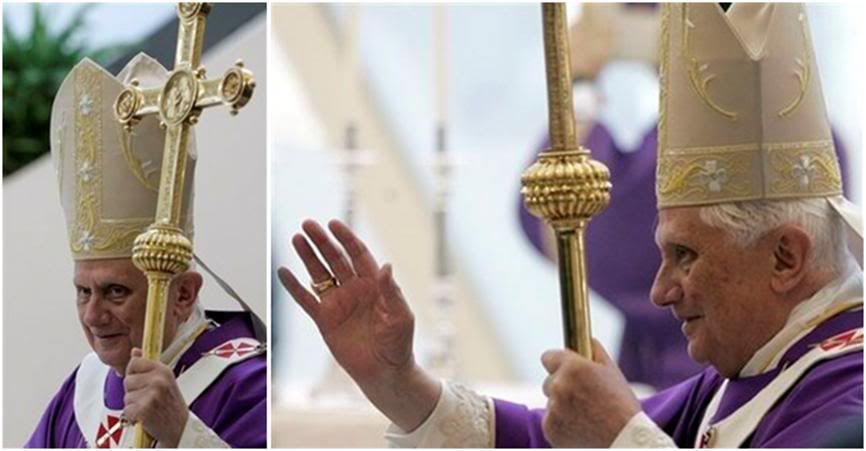
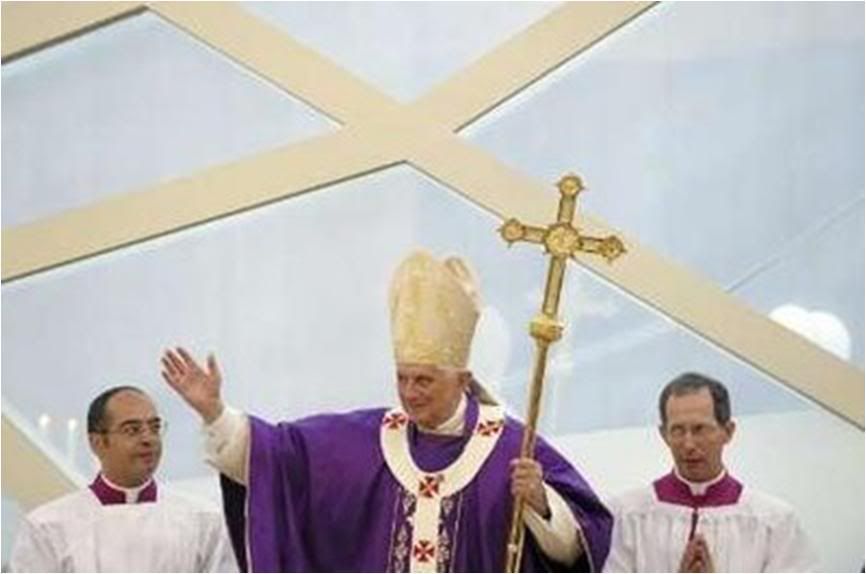
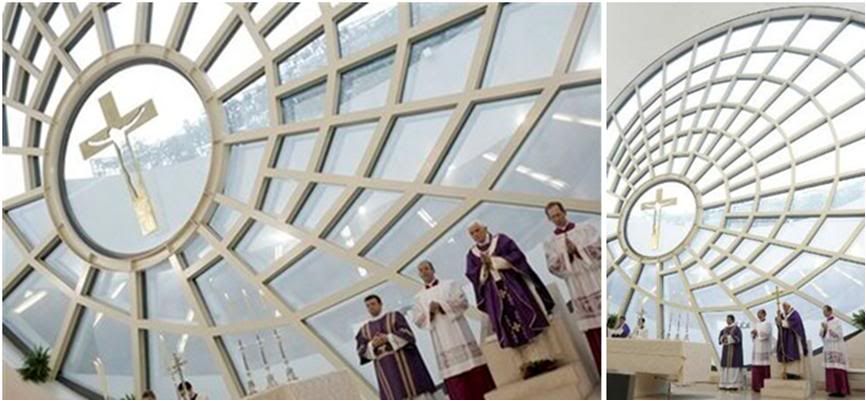 Here is a translation of the Holy Father's homily today:
Here is a translation of the Holy Father's homily today:
Dear brothers and sisters,
In today's Gospel, St. John recounts an episode that took place in the last stage of the public life of Jesus, with the Jewish Passover imminent, which would be the Passover of death and resurrection.
When he was in Jerusalem, the Evangelist tells us, some Greeks, converted from Judaism, were curious about him and attracted by what he had been doing. They approached Phillip, one of the Twelve Apostles, who had a Greek name but was from Galilee. "Sir," they said, "we would like to see Jesus".
Phillip in turn called Andrew, one of the first apostles who was very close to Jesus - he too had a Greek name - and both of them "went and told Jesus" (cfr Jn 12,20-21).
In teh request by these anonymous Greeks, we can read the thirst that is in the heart of every man to see and to know Christ. And the response of Jesus orients us to the mystery of Easter, the glorious manifestation of his salvific mission.
"The hour has come", he said, "for the Son of Man to be glorified" (Jn 12, 23). Yes, the hour of the glorification of the Son of Man is about to come, but this will require a sorrowful transition through his Passion and death on the Cross.
Indeed, only that way could the divine plan of salvation be realized, which is for everyone, Jews and Greeks, Jews and pagans. All are invited to be part of the one people of the new and definitive alliance.
In this light, we can also understand the solemn proclamation that concludes this Gospel passage: "And when I am lifted up from the earth, I will draw everyone to myself" (Jn 12,32), as well as the Evangelist's comment: "He said this ,indicating the kind of death he would die" (Jn 12,33).
The cross, which is the height of love, is the measure of Christ, and this measure attracts everyone.
Very opportunely, the liturgy makes us meditate on this text of the Gospel of John on this fifth Sunday of Lent, when the days of the Lord's Passion are drawing near, in which we shall immerse ourselves spiritually starting next Sunday, appropriately called the Sunday of the Palms and of the Passion of our Lord.
It is as if the Church is stimulating us to share in Jesus's state of mind, to prepare us to relive the Mystery of his crucifixion, death and resurrection, not as extraneous spectators, but as protagonists along with him, involved in the mystery of the Cross and the Resurrection.
Where Christ is, there his disciples should be, who are called to follow him, to be one with him at the moment of struggle, in order to be co-participants in his triumph.
Then, what does our association with his mission consist of? The Lord himself explains it. Speaking of his coming glorious death, he uses - as we heard - a simple image that is also very suggestive: "Unless a grain of wheat falls to the ground and dies, it remains just a grain of wheat, but if it dies, it produces much fruit" (Jn 12,24).
Thus, Jesus compares himself to 'a grain of wheat that dies in order to bring much fruit to everyone", according to an effective saying by St. Athanasius. It is only through death that the Cross has borne much fruit through the centuries.
It was not enough that the Son of Man was incarnated. In order to bring to completion the divine plan of universal salvation, it was necessary that he be killed and buried, and that way, all of human reality is accepted in his death, and his resurrection would make manifest the triumph of Life, because it was the triumph of his love. And thus he shows that love, and love alone, is stronger than death.
And yet, the man Jesus was a true man, with our feelings, and he felt the weight of the ordeal as well as bitter sorrow over the tragic end that awaited him. Precisely by being man, God felt all the more the abyss of terror, which is also the abyss of human sin, of everything that is filthy in man, which he had to carry with him and transfer over to his love.
"I am troubled now," he confesses, "yet what would I say? 'Father, save me from this hour?'" (Jn 12,27). Almost there is the temptation to ask "Save me, do not allow the Cross, give me life".
We grasp from this sorrowful invocation of his an anticipation of the agonized prayer in Gethsemane, when, experiencing the drama of solitude and fear, he would implore the Father to take away the chalice of passion.
But at the same time, his filial adherence to the divine plan never failed, because he knew "it was for this purpose that i came to this hour" and he prays with trust: "Father, glorify your name" (Jn 12,28). This means, "I accept the Cross", on which the name of God is glorified, that is, the greatness of his love. And it also anticipates the words on the Mount of Olives: "Not my will but yours".
He transforms his human will and identifies it with the divine will. This is the great process on the Mount of Olives, that which should be realized in every prayer we make: to transform our selfish will, to allow it to be transformed, to open it up so that it may be transformed to the divine will.
The same sentiments emerge in the passage from the Letter to the Hebrews, proclaimed in today's Second Reading. Prostrated by extreme anguish because of the death that hangs over him, Jesus offers to God - the letter says - prayers and supplications "with loud cries and tears" (Heb 5,7).
He asks the help of Him who could save him, while always abandoning himself in the hands of the Father. For this filial trust in God, the author notes, his wish was granted, in the sense that he was resurrected, that he received the new and definitive life.
The Letter to the Hebrews makes us understand that his insistent prayers, offered with loud cries and tears, was the very act of the Supreme High Priest offering himself and mankind to the Father, thus transforming the world.
Dear brothers and sisters, this is the demanding way of the Cross which Jesus indicates to all his disciples. Several times he said, "Whoever serves me must follow me". There is no alternative for the Christian who wants to realize his calling.
It is the 'law' of the Cross described with the image of the grain of wheat that dies in order to sprout to new life. It is the 'logic' of the Cross recalled in today's Gospel: "Whoever loves his life loses it, and whoever hates life in this world will preserve it for eternal life".
"To hate" one's life was a strong and paradoxical Jewish expression which underscores the radical totality that should distinguish him who follows Christ and places himself, for love of him, at the service of his brothers. He loses his life and thus finds it. There is no other way to experience the joy and true fecundity of Love, which is giving oneself, losing oneself in order to find oneself.
Dear friends, Jesus's invitation resounds perticularly eloquent in the celebration today in your parish. It is dedicated to the Holy Face of Jesus: that Face which 'some Greeks', the Gospel tells us, wanted to see; that Face which in the coming days of the Passion, we shall contemplate disfigured because of man's sins, indifference and ingratitude; that Face radiant with light and blazing with glory, which will shine forth on Easter dawn.
Let us keep our heart and mind focused on the Face of Christ, dear faithful, whom I greet affectionately, starting with your parish priest, Don Luigi Coluzzi, to whom I am also grateful for having conveyed your sentiments.
Thank you for your cordial welcome. I am truly happy to find myself among you on the occasion of the third anniversary of the dedication of your church, and I salute everyone with affection.
I address a special greeting to the Cardinal Vicar (Agostino Vallini); to Cardinal Fiorenzo Angelini, who contributed to the realization of this new parochial complex; to the Auxiliary Bishop of the sector and other prelates present; His Excellency Mons. Costalunga; the priests and other parish workers; to the meritorious nuns of the Congregation of the Poor Daughters of the Visitation, who have their Rest Home for the Aged right in front of this beautiful church.
I greet the catechists, the Parish Council and all pastoral workers and those who work together in the daily life of the parish. I greet the children, young people and families. And I extend my greeting to all the inhabitants of Magliana, especially the aged, the sick, those who are alone and in difficulty. I assure for everyone my prayers at this Holy Mass. [APPLAUSE]
Dear brothers and sisters, allow yourselves to be enlightened by the splendor of the Face of Christ, so that your young community - which can avail of the new parish complex that is modern in its structure and functioning - will walk united, in the common commitment to announce and bear witness to the Gospel in this district.
I know how much attention you are giving to liturgical formation, making full use of every resource in your community - readers, the choir, and all who are involved in animating the celebrations. It is important that prayer, personal as well as liturgical, always occupies first place in your lives.
I know the commitment which you devote to catecheses, so that it may respond to the expectations of young people - those who are preparing themselves to receive the sacraments of First Communion and of Confirmation, as well as those who often frequent the oratory.
Concern yourself as well with assuring a catechesis that is adapted to their parents, whom you should invite to follow a course of Christian formation along with their children, Thus you will help families to live together through the sacramental appointments, educating them in the faith 'within the family', which should be the first and natural 'school' of Christian life for all its members.
I rejoice with you that your parish is open and welcoming, animated and made lively by a sincere love of God and all your brothers, in imitation of St. Maximilian Kolbe, to whom the parish was originally dedicated.As you know, in Auschwitz, he sacrificed himself with heroic courage to save the life of others.
In this our time, which is marked by a general social and economic crisis, your efforts are very meriotorious, through the parish
Caritas and the Sant'Egidio group, to meet as far as possible the needs of the poorest and the most needy.
I want to reserve a special encouragement to you, dear young people. Let yourself be drawn into the fascination of Christ. With the eyes of faith, look at his Face and ask him, "Jesus, what do you want me to do with you and for you?"
Be attentive and listen, and guided by his Spirit, follow the plan that he has for you. Prepare yourselves seriously to build united families that are faithful to the Gospel and to be its witnesses in society which needs these testimony.
And if the Lord calls you, be ready to dedicate your existence completely to his service in the Church as priests, or as religious men and wome., I assure you of my prayers.
In particular, I expect you on Thursday at St. Peter's Basilica where we will prepare ourselves for World Youth Day which, as you know, is celebrated this year on the diocesan level next Sunday.
We will remember together my beloved and venerated predecessor, the servant of God, Pope John p[aul II, on the fourth anniversary of his death. On many occasions, he encouraged young people to meet Christ and follow him with enthusiasm and generosity.
Dear brothers and sisters of this parish community, may the infinite love of Christ which shines forth from his Face be reflected in your every attitude and become your 'day to day'.
St. Augustine exhorted in a paschal homily: "Christ suffered; we die to sin. Christ rose again; we live for God. Christ has gone from this world to the Father; let not our hearts stay behind but follow him above. Our leader was hung on the Cross; let us crucify the concupiscence of the flesh. He lies in the sepulchre; entombed with him, let us forget the things of the past. He sits in heaven; let us transfer our desires to the supreme things" (S. Augustine, Discourses 229/D, 1).
Inspired by this awareness, let us proceed with the Eucharistic celebration, invoking the maternal intercession of Mary, so that our existence may become a reflection of that of Jesus.
Let us pray so that all whom we meet may always perceive in our acts and words the pacifying and comforting goodness of his Face. Amen.
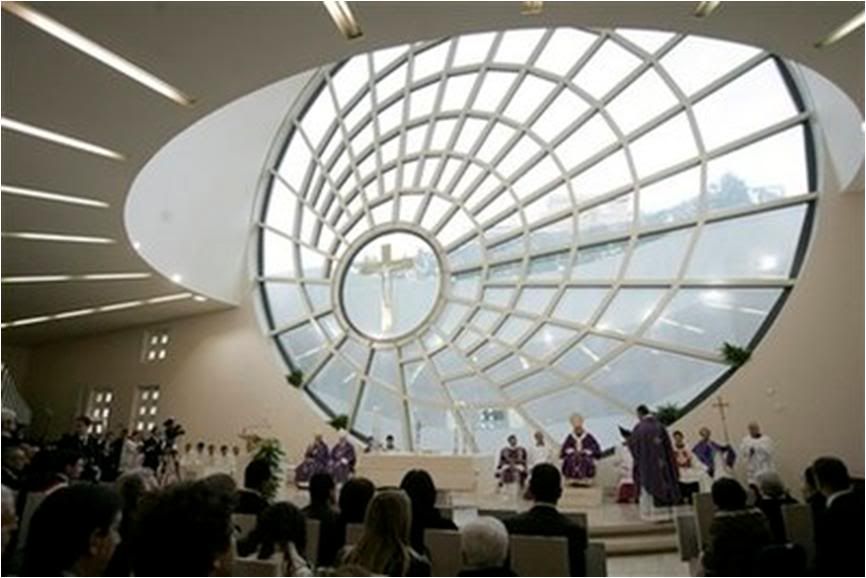
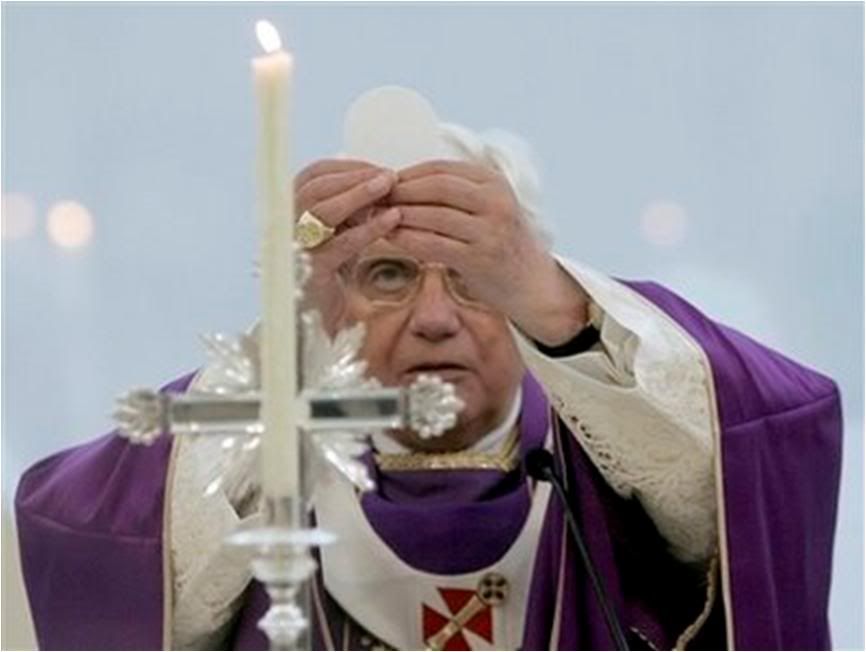
[Modificato da TERESA BENEDETTA 29/03/2009 21:56] |
 29/03/2009 15:44 29/03/2009 15:44 |
|
| | | OFFLINE | | Post: 16.992 | Registrato il: 28/08/2005
| Utente Gold | |
|

 AFTER DEFENDING THE POPE:
AFTER DEFENDING THE POPE:
IS DR. GREEN PAYING THE PRICE
FOR BEING POLITICALLY INCORRECT?
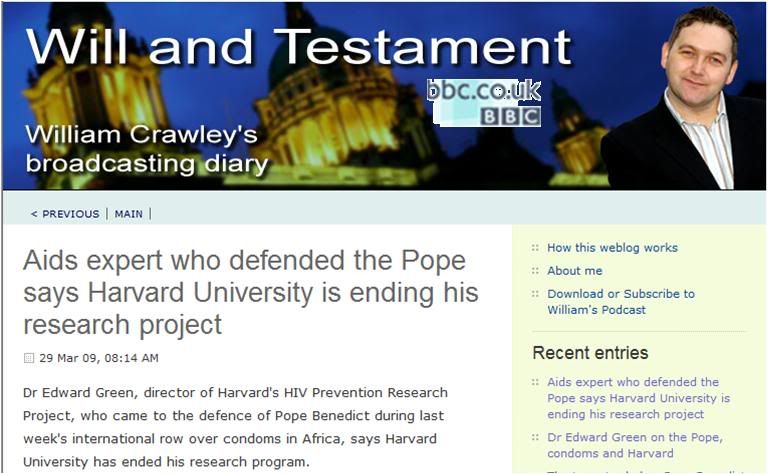
March 29, 2009

Dr Edward Green, director of Harvard's HIV Prevention Research Project, who came to the defence of Pope Benedict during last week's international row over condoms in Africa, says Harvard University has ended his research program.
In an extended interview on today's Sunday Sequence, Dr Green told me why he decided to voice his support to Pope Benedict's controversial claim that condom distribution is exacerbating the problem of Aids in Africa. He also challenges the scientific authority of the United Nations Aids organisation, and argues that condoms should be used in Africa as part of a combination strategy to combat Aids. Dr Green says, "I have always been politically incorrect. I have always questioned authority and tried to speak truth to power whatever the consequences." A full transcript of the interview is below the line.
Edward Green: What the Pope said was the distribution and marketing of condoms would not solve the problem of African Aids and that it might even exacerbate the problem. And I think it was that second comment that really set the critics off, really upset a lot of people. I can understand that, because I have worked in Aids prevention for a long time. In fact, I worked as a condom and contraceptive social marketer at the beginning of the pandemic--I was working in family planning. I am part of a group of researchers that have been looking for the behavioural antecedents to HIV prevalence decline in Africa. We now see HIV going down in about 8 or 9 countries in Africa and in every case we see a decrease in the proportion of men and women who report having more than one sex partner in the past year. So when the Pope said that the answer really lies in monogamy and martial faithfulness, that's exactly what we found empirically.
William Crawley: What's the evidence that you are appealing to that condom distribution has made things worse in Africa?
Edward Green: Because we have for a number of years now found the wrong kind of association between condom-availability and levels of condom use.. You see the wrong kind of relationship with HIV prevalence. Instead of seeing this associated with lower HIV infection rates, it's actually associated with higher HIV infection rates. Part of that is because the people using condoms are the people who are having risky sex. It's just like there is more bed nets in use in countries with malaria than in countries without such high levels of malaria.
William Crawley: So it would be a mistake to draw any causal connection between an increase in the use of condoms and an increase in HIV prevalence. That would be a mistake, wouldn't it?
Edward Green: We don't have any proof. The closest thing we have are some prospective studies that follow the same populations. There was one where--Norman Hurst of the University of California was one of the authors, it was published in the journal Aids--where they followed two groups of young people in Uganda, and the group that had the intensive condom promotion--and they were provided condoms after three years--they actually were found to have a greater number of sex partners. So that cancels out the risk reduction that the technology of condoms ought to provide. That's the phenomenon known as risk compensation.
William Crawley: What do you mean by risk compensation?
Edward Green: This is when somebody uses a technology, such as condoms or sun-block, to reduce the risk, but then they compensate for that, or actually lose the risk reduction, by exposure to the sun longer in the case of sun-block or they take greater sexual risks in the case of condoms.
William Crawley: What you have suggested is that the use of condoms in Africa is a complicated story: it relates to abstinence and monogamy programmes as well. In those countries where there has been a reduction in HIV infection, such as Uganda, all three seem to play a part--abstinence, monogamy and the use of condoms. At least according to the United Nations Aids organisation (UNAids), all three play a part. Do you have any evidence at all that condoms are making the problem worse, which is what the Pope suggests?
Edward Green: Well I just mentioned a study that was done in Uganda that suggests that with intensive promotion of condoms you actually have people increasing the number of sexual partners, so in that sense--
William Crawley: But you have already accepted that there can be no causal inference drawn from that study.
Edward Green: Well, except that the phenomenon of risk compensation, or behavioural dis-inhibition, is real, and there have been articles, including published in The Lancet, about this phenomenon. So there could be a causal connection.
William Crawley: The Lancet has described the Pope's comments, which you agree with, as a distortion of scientific evidence.
Edward Green: That's because The Lancet is not thinking about the generalised epidemics of Africa. I hasten to add--and I have tried to do this in all of my interviews, although sometimes only part of my interviews are quoted--I point out that at national levels, we see condoms working in epidemics like those of Thailand and Cambodia. But in the generalised epidemics of Africa--well, there was a UN Aids study done in 2003 by Hearst and Chen, it was actually published in the peer-reviewed journal Studies in Family Planning in 2004, and they conclude that there is not a single country in Africa where HIV prevalence has come down primarily because of condoms.
William Crawley: You accept that condoms do work in other parts of the world, like the Western World, for example?
Edward Green: I do. And they should have a back-up role even in the generalised epidemics of Africa. I believe condoms should be made available to everyone. It should be, and as you say, the ABC strategy: Abstain, Be faithful, use a Condom. Condoms may well have contributed to the prevalence decline in Uganda.
William Crawley: That's a serious ideological difference between yourself and the Pope. He doesn't think that condoms should be used, even in the case of married Catholic couples where one of the partners is HIV-positive.
Edward Green: Yes, well, I don't agree with that. And, I have said that I am not a Catholic, and I am not talking about condoms in any sort of moral-ethical sense. I am talking about what has been found to work and not work. So, yes, the article I mentioned by Hearst and Chen is very clear that condoms work in certain types of situations and certain sub-populations and condoms have had a positive national impact in certain concentrated epidemics. So, yes, I don't agree with the Pope across the board.
William Crawley: Which brings us back to Africa. And to try to explain why there has been a mixed experience in terms of condom distribution in Africa, you are appealing to this possible mechanism of risk compensation. Which is another way of saying, really, that when people feel they are protected by a condom they engage is other risky behaviours. And one could say in response to that, this is not a criticism of condom distribution, it's a criticism of the education programmes that accompany condom distribution, surely?
Edward Green: Yes, we can say that. It's just I am somebody, who, as I mentioned I think, worked in family planning at the beginning--before the Aids pandemic began. And I think we have tried just about everything that can be tried as far as getting people to use condoms consistently and correctly in general populations. You know it's possible in certain sub-populations, such as commercial sex workers and their clients--even in Cambodia and Thailand, it was commercial sex workers in brothels where the 100 per cent condom policy was implemented and was so successful. But once you get outside of brothels are some situations where you have some control, it's again very difficult to get people to use condoms. So, yes, it's the fault of the person and not with the physical device the condom.
William Crawley: You can see why some people perhaps misunderstand your position, Dr Green, because you make a blunt statement like "the Pope is right about this" and "he is right on the science". And it is a much more complicated story once we explore it a little bit. You are encouraging the use of condoms in Africa. You are just saying: in addition to that, we should take seriously abstinence and, particularly, "be faithful" (monogamy) programmes, as well in Africa. That's a very different position to the one that the Pope holds to.
Edward Green: Well, you could phrase it that way. Or you could say: the Pope said that the distribution and marketing of condoms is not the solution or the best solution to African Aids; rather, it is monogamy and faithfulness. And the evidence is so clear about partner reduction. If you promote monogamy and faithfulness what you get is a reduction in the number of partners and concurrent partners. We haven't mentioned concurrency: we are finding that if you have partners, ongoing relationships that overlap, these are particularly effective in transmitting HIV. The evidence is so clear about that, that one of the reasons I stuck my neck out, knowing that I would get into a lot of trouble with my peers and colleagues, is because the Pope didn't repeat the usual condoms-versus-abstinence but instead mentioned fidelity and monogamy.
William Crawley: The United Nations Aids organisation says recent analysis of the Aids epidemic in Uganda confirms, and I am quoting, "that increased condom use in conjunction with delay in age and first sexual intercourse and reduction of sexual partners was an important factor in the decline of HIV prevalence in the 1990s". They say it was all three: ABC. The Pope says it was AB. And you seem to be agreeing with him.
Edward Green: Well, you must understand that UN Aids is not a scientific body. It's an advocacy body. And, in fact, a former director, Peter Piot, in recent years has been saying that what they do is "evidence-informed" rather that "evidence-based". If you stop and think about that distinction, you know, it suggests that UNAids draws upon the evidence that supports what it believes.
William Crawley: We shouldn't trust the UNAids organisation on this?
Edward Green: I would be very careful about trusting the UNAids organisation for anything scientific anything having to do with, for example, statistics about Aids. They have had to back-pedal and retract a lot of their basic statistics. It may seem pretty shocking for somebody like me to disagree with UNAids, but the fact is that UNAids is changing its thinking on this matter. As a matter of fact, in a very few days, there is going to be joint statement released by our Harvard programme, the Southern Regional Office of UNAids, and the Southern Regional Office of the World Bank, saying that the primary intervention for Aids in Southern Africa should be to discourage multiple and concurrent partners and that condom promotion is a secondary backup strategy.
William Crawley: How can you believe that condom promotion should be a back up strategy and also believe that "condom distribution is making matters worse in Africa"?
Edward Green: Well, I wouldn't keep saying that way, I am--
William Crawley: That's what the pope said, and that's what you say you agree with--
Edward Green: Higher condom use and higher infection rates could be explained in a number of ways: we should be alert to the fact that one of those ways could be dis-inhibition. This has been sort of a taboo word in the field of Aids. We don't want to think that, possibly, we are making the situation worse by giving people a greater sense of security than they ought to have. But, you know, we should think about that possibility.
William Crawley: But condoms are either making the problem worse in Africa, or they are a backup strategy, which is it?
Edward Green: Well, I would say that they should, again, be made available. They should be available as a backup strategy. It's obviously better to not indulge in a risk behaviour ... Lets go back to what we know about condoms: when they are used consistently, when they are used consistently, they provide, under more or less ideal conditions, about 80 to 85 per cent risk reduction, compared to those who don't use them at all. But how many--what percentage of any large national population--uses condoms consistently? Probably nowhere in excess of 5 per cent.
William Crawley: There does seem to be a world of a difference, Dr Green, between what you have just said, and the Pope's simple claim that condoms are aggravating the problem in Africa. Those two positions do not seem to be the same, and yet you say you agree with the Pope.
Edward Green: I told you that I stuck my neck out knowing it would be controversial, because the Pope said that the distribution of condoms was not the solution, that monogamy and fidelity was. It depends on how you look at condoms. Condoms, as a technology, can work in certain circumstances. Yes, they should be a backup if people are not going to avoid the risk altogether. But looking at it from a public health standpoint, we have not seen that condoms have worked at the population or national levels in Africa. So you can interpret that I suppose in different ways.
William Crawley: Let's come to the situation that your programme faces at Harvard University. You have said that you have managed to put yourself in some difficulties with some of your peers. What is the situation you are facing now at Harvard?
Edward Green: Well, before this most recent situation came up with my name being in the news a lot in connection with the Pope, our project was coming to an end, and actually has come to an end. We are running currently on a no-cost extension for another approximately 11 months.
[William Crawley: So you regard your position on this as somehow "politically incorrect" over the years in terms of the politics of all of this?
Edward Green: Yes, my position is very politically incorrect. I have always been politically incorrect. I have always questioned authority and tried to speak truth to power whatever the consequences.
William Crawley: Are you are paying an institutional price for that in terms of Harvard?
Edward Green: Well, I don't know. I don't know whether our programme would have ended when it's ending if I had been more politically correct. You would have to ask Harvard.
In today's ashington Post, Dr. Green has this article. Note that the headline given by the Post to the article is 'The Pope may be right', even if the article is all about the empirical evidence that so far supports what the Pope says:
The Pope may be right
By Edward C. Green

Sunday, March 29, 2009 Page A15
When Pope Benedict XVI commented this month that condom distribution isn't helping, and may be worsening, the spread of HIV/AIDS in Africa, he set off a firestorm of protest. Most non-Catholic commentary has been highly critical of the pope.
A cartoon in the Philadelphia Inquirer, reprinted in The Post, showed the Pope somewhat ghoulishly praising a throng of sick and dying Africans: "Blessed are the sick, for they have not used condoms."
Yet, in truth, current empirical evidence supports him.
We liberals who work in the fields of global HIV/AIDS and family planning take terrible professional risks if we side with the Pope on a divisive topic such as this.
The condom has become a symbol of freedom and -- along with contraception -- female emancipation, so those who question condom orthodoxy are accused of being against these causes. My comments are only about the question of condoms working to stem the spread of AIDS in Africa's generalized epidemics -- nowhere else.
In 2003, Norman Hearst and Sanny Chen of the University of California conducted a condom effectiveness study for the United Nations' AIDS program and found no evidence of condoms working as a primary in HIV-prevention measure in Africa. UNAIDS quietly disowned the study. (The authors eventually managed to publish their findings in the quarterly Studies in Family Planning.)
Since then, major articles in other peer-reviewed journals such as the Lancet, Science and BMJ (British Medical Journal) have confirmed that condoms have not worked as a primary intervention in the population-wide epidemics of Africa.
In a 2008 article in Science called "Reassessing HIV Prevention" 10 AIDS experts concluded that "consistent condom use has not reached a sufficiently high level, even after many years of widespread and often aggressive promotion, to produce a measurable slowing of new infections in the generalized epidemics of Sub-Saharan Africa."
Let me quickly add that condom promotion has worked in countries such as Thailand and Cambodia, where most HIV is transmitted through commercial sex and where it has been possible to enforce a 100 percent condom use policy in brothels (but not outside of them).
In theory, condom promotions ought to work everywhere. And intuitively, some condom use ought to be better than no use. But that's not what the research in Africa shows.
Why not?
One reason is "risk compensation." That is, when people think they're made safe by using condoms at least some of the time, they actually engage in riskier sex.
Another factor is that people seldom use condoms in steady relationships because doing so would imply a lack of trust. (And if condom use rates go up, it's possible we are seeing an increase of casual or commercial sex.)
However, it's those ongoing relationships that drive Africa's worst epidemics. In these, most HIV infections are found in general populations, not in high-risk groups such as sex workers, gay men or persons who inject drugs.
And in significant proportions of African populations, people have two or more regular sex partners who overlap in time. In Botswana, which has one of the world's highest HIV rates, 43 percent of men and 17 percent of women surveyed had two or more regular sex partners in the previous year.
These ongoing multiple concurrent sex partnerships resemble a giant, invisible web of relationships through which HIV/AIDS spreads. A study in Malawi showed that even though the average number of sexual partners was only slightly over two, fully two-thirds of this population was interconnected through such networks of overlapping, ongoing relationships.
So what has worked in Africa? Strategies that break up these multiple and concurrent sexual networks -- or, in plain language, faithful mutual monogamy or at least reduction in numbers of partners, especially concurrent ones. "Closed" or faithful polygamy can work as well.
In Uganda's early, largely home-grown AIDS program, which began in 1986, the focus was on "Sticking to One Partner" or "Zero Grazing" (which meant remaining faithful within a polygamous marriage) and "Loving Faithfully." These simple messages worked.
More recently, the two countries with the highest HIV infection rates, Swaziland and Botswana, have both launched campaigns that discourage people from having multiple and concurrent sexual partners.
Don't misunderstand me; I am not anti-condom. All people should have full access to condoms, and condoms should always be a backup strategy for those who will not or cannot remain in a mutually faithful relationship. This was a key point in a 2004 "consensus statement" published and endorsed by some 150 global AIDS experts, including representatives the United Nations, World Health Organization and World Bank.
These experts also affirmed that for sexually active adults, the first priority should be to promote mutual fidelity. Moreover, liberals and conservatives agree that condoms cannot address challenges that remain critical in Africa such as cross-generational sex, gender inequality and an end to domestic violence, rape and sexual coercion.
Surely it's time to start providing more evidence-based AIDS prevention in Africa.
The writer is a senior research scientist at the Harvard School of Public Health.
[Modificato da TERESA BENEDETTA 30/03/2009 02:07] |
 29/03/2009 16:55 29/03/2009 16:55 |
|
| | | OFFLINE | | Post: 16.993 | Registrato il: 28/08/2005
| Utente Gold | |
|
 ANGELUS TODAY
ANGELUS TODAY
Upon his return from a pastoral visit to the Roman parish of Santo Volto di Gesu (Holy Face of Jesus), teh Holy Father led the noontime Sunday Angelus as usual, from his study window in the Apostolic Palace.
Prominent among the faithful who gathered were African students in Rome who manifested their support for the Pope and their gratitude for his recent visit to Africa, which he described in his message before the Angelus prayers.
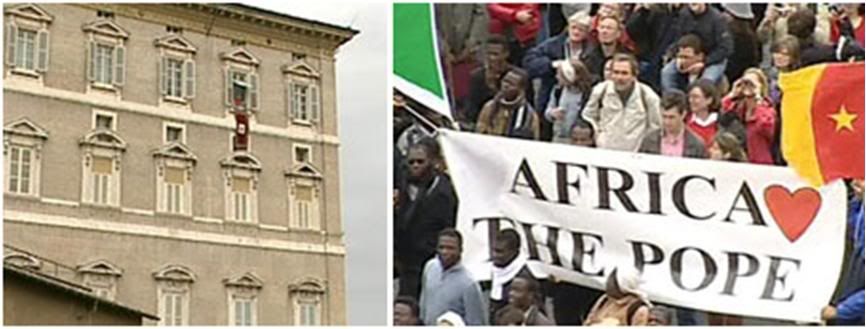
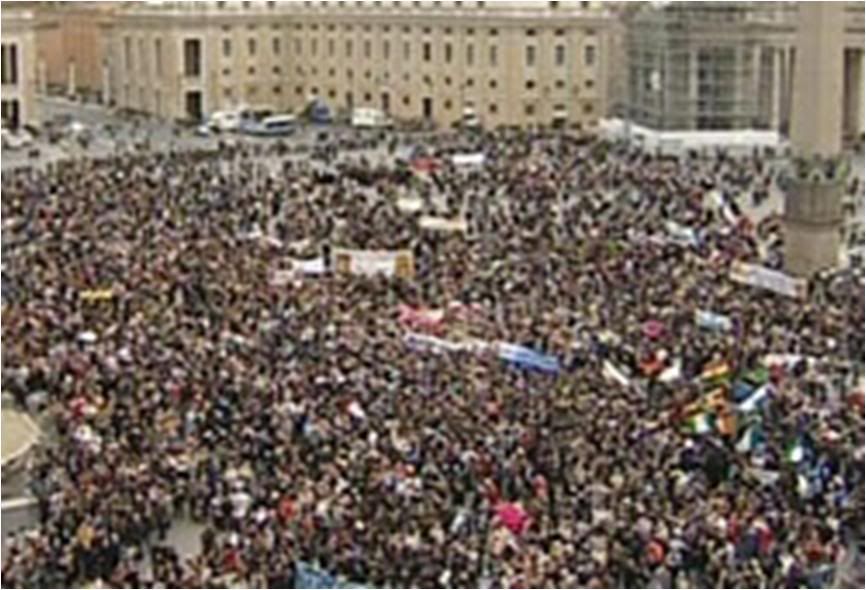
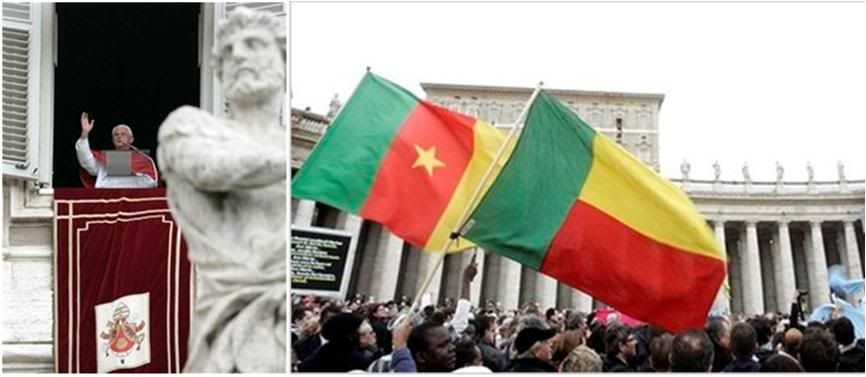 Here is a translation of the Holy Father's words at Angelus today:
Here is a translation of the Holy Father's words at Angelus today:
Dear brothers and sisters!
First I wish to thank God and all those who, in various ways, worked together for the success of the apostolic trip that I was able to make to Africa in recent days, and I invoke on all the seeds spread throughout African soil the abundance of heavenly blessings.
I will speak more about this significant pastoral experience at the General Audience on Wednesday, but I cannot miss this occasion to manifest the profound emotion I experienced in meeting the Catholic communities and peoples of Cameroon and Angola.
What struck me most were two aspects, both of them very important. The first is the joy that is visible in the faces of the people - the joy of feeling oneself part of the one family of God - and I thank the Lord for having allowed me to share with those brothers and sisters of ours moments of simple celebration, which was unanimous and full of faith.
The second aspect was the sense of the sacred that one could breathe during the liturgical celebrations - a characteristic that is common to all the peoples of Africa, and which emerged, I can say, at every moment of my sojourn with those dear peoples.
The visit allowed me to see and understand better the reality of the Church in Africa in the variety of its experiences and the challenges that have to be faced at this time.
Precisely in thinking about the challenges that mark the Church's journey on the African continent, and in every other part of the world, we note how actual the words of the Gospel are today on this fifth Sunday of Lent.
Jesus, with his passion imminent, says: "Unless a grain of wheat falls to the ground and dies, it remains just a grain of wheat;
but if it dies, it produces much fruit" (Jn 12,24).
It was now a time not for words and discourses: the decisive hour had come, for which the Son of God had come to the world, and even if his soul was much perturbed, he made himself willing to complete to its very end the will of the Father.
This is the will of God: to give eternal life to us who have lost it. But in order to realize this, it was necessary that Jesus should die, like a grain of wheat that God the Father had sown in the world.
Indeed, only that way could a new humanity sprout and grow, free of the dominion of sin and able to live in brotherhood, as sons and daughters of the one Father who is in heaven.
In the great feast of faith that people live together in Africa, we experienced how this new humanity is alive, even with its human limitations. There, where missionaries, like Jesus, have given adn continue to give their lives for the Gospel, abundant fruit is being harvested.
I wish to address to them a special thought of gratitude for all the good they are doing. They are priests, religious men and women, and lay men and women. I found it beautiful to see the fruit of their love for Christ and to feel the profound gratitude that Christians have for them.
Let us give thanks to God, and let us pray to the Most Blessed Virgin so that Christ's message of hope and love may be spread throughout the world.
After the Angelus, he said this:
With great affection, I greet the numerous Africans who live in Rome, among them many students, who are accompanied today by Mons. Robert Sarah, secretary of the Congregation for the Evangelization of Peoples.
Dearest ones, you have come to show your joy and acknowledgment of my apostolic trip to Africa. I thank you from the heart. I am praying for you, for your families and for your countries of origin. Thank you!
On Thursday, at 6 p.m., I will preside at Holy Mass in St. Peter's Basilica to mark the fourth anniversary of the death of my beloved predecessor, the Servant of God John Paul II.
I invite the youth of Rome, particularly, to participate, so that together we may prepare for World Youth Day which will be celebrated on the diocesan level on Palm Sunday.
In English, he said:
I am pleased to welcome all the English-speaking pilgrims to this Angelus, especially students and teachers from Holy Trinity Catholic High School in Edmonton, Canada.
In today’s liturgy, Jesus teaches that "unless a grain of wheat falls to the ground and dies, it remains just a grain of wheat; but if it dies, it produces much fruit".
In these final weeks of Lent, let us intensify our prayer, fasting and almsgiving. In this way, we will prepare ourselves to meditate on Christ’s passion and death, so as to rejoice fully in the glory of his Resurrection.
God bless you all!
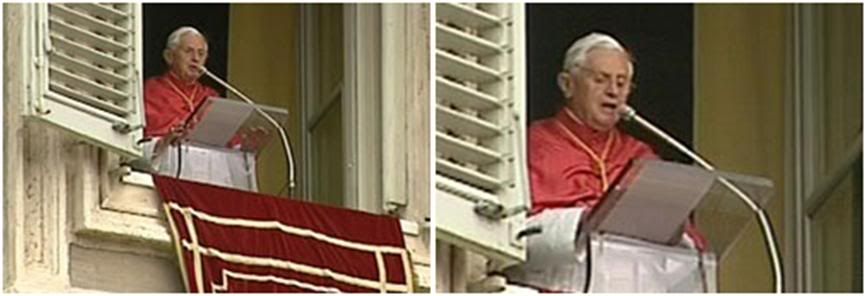
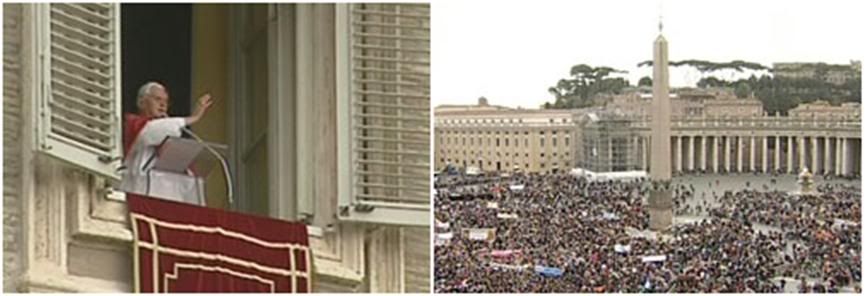

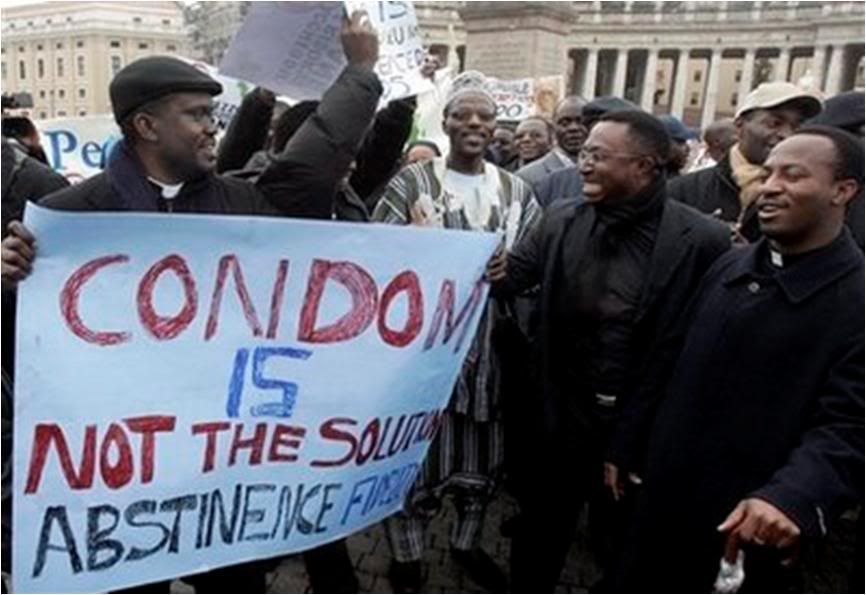
[Modificato da TERESA BENEDETTA 29/03/2009 23:06] |
 30/03/2009 06:15 30/03/2009 06:15 |
|
| | | OFFLINE | | Post: 16.999 | Registrato il: 28/08/2005
| Utente Gold | |
|
 Here are two pieces from Panorama, the Italian newsweekly magazine, by two of their columnists who are decidedly pro-Benedict. Gianni Baget Bozzo is a theologian-priest who has been a politician as well and an active journalist, while Giuliano Ferrara is editor of Il Foglio newspaper and one of Italy's famous 'devout atheists' (like Marcello Pera) who share the moral and ethical positions of the Catholic Church.
Papa Ratzinger and
Here are two pieces from Panorama, the Italian newsweekly magazine, by two of their columnists who are decidedly pro-Benedict. Gianni Baget Bozzo is a theologian-priest who has been a politician as well and an active journalist, while Giuliano Ferrara is editor of Il Foglio newspaper and one of Italy's famous 'devout atheists' (like Marcello Pera) who share the moral and ethical positions of the Catholic Church.
Papa Ratzinger and
the papal charism
by GIANNI BAGET BOZZO
Translated from

March 20, 2009
This Pope will not cease surprising us.
He sent the bishops of the world not a doctrinal encyclical but an apostolic predication. He said that in the opposition to his revoking the excommunication of the Lefebvrian bishops, he has come up against a real episcopal hatred directed against the FSSPX but also extending to the Pope himself.
It is as if the FSSPX has become the scapegoat as well as the measure by which the Pope's episcopal opponents are defining themselves and their idea of the Church.
The work of Cardinal Joseph Ratzinger, continued in that of Benedict XVI, was to show that there was a division in the Church on the 'reception' of Vatican-II.
There are those who think in terms of continuity with tradition, a development and renewal of elements already found in the Church. And there are those who considered it a new beginning, a rupture with the Church of the Counter-Reformation, a concept of Church different from one based on a continuity of the Catholic tradition.
And Pope Benedict has been able to complete what he began as a cardinal - namely, to establish the validity of the Church of Tradition in its most evident reality: the liturgy of the ages.
With this perspective, he has been able to offer to all those who saw the dominance of the Council-as-rupture in their own communities a way to return to unity within the Church, now confirmed in its perennial tradition while renewing itself within this continuity.
Benedict XVI's positions are exactly those of Paul VI and John Paul II in holding up the Petrine primacy, expressed in the Roman papacy, at the vertex of the Church, as an expression of its miraculous and mysterious capacity to bring together diverse spaces and times in the unity of tradition.
This Pope speaks forcefully about the Petrine mission in the letter to the bishops, because what's in play is the functioning of the Papacy itself - and the continuity of the charism that was conferred on Peter and his successors to keep the Church together and united in its identity as the Mystical Body of Christ.
In the comments that followed the Pope's letter, it was written that the Pope was alone in facing dissent that has even involved the relationship of the Church with Judaism, on which Ratzinger had always worked so much, out of personal conviction and faithfulness to Vatican II.
And so the Pope said he was thankful to those Jews who showed support for him during the crisis, who understand, in effect, the role of the papacy in promoting relations between the Church and Judaism.
No one contributed more during the post-Conciliar years to maintain the unity of the Church within Tradition, and the Petrine charism in its universality than Joseph Ratzinger-Benedict XVI.
Benedict speaks the language that the Catholic Church must speak if it wishes to remain the Catholic Church. And it makes no sense to speak of isolation about a man to whom Catholicism and the faithful owe so much.
Someone who, at the very time when a banal communications blunder created such tumult, has shown he can speak the language of papal charism with the tone of a prophet who speaks to the spirit and to the heart and exorcises them of any hatred that may be in them.
[ Let it be so!]
Why they want to strike down
Papa Ratzinger
by Giuliano Ferrara
Translated from

March 27, 2009
To understand where the hostile siege against Benedict XVI is coming from - whether for simply being himself or for having said very reasonable things about Islam in Regensburg or about condoms enroute to Africa - all it takes is a bit of history.
John XXIII was perceived by the world, on the cusp between the end of the 1950s and the start of the 1960s, as both spiritual rupture and growth. And he was.
The Church of the Popes Pius up to Pius XII who died in 1958, nonetheless, had accomplished great and modern things - from Vatican Radio inaugurated by Pius XI to the encyclical written by Cardinal Bea under Pius XII, accepting the historico-critical method of reading the Bible.
But for the essentials, the Church was consciously and understandably trapped in the modernist crisis`of the late 19th century and the start of the 20th - what came to light now was its conflict with the world of experience, of history, of the social and cultural dynamic that was directed against dogma and certain perennial ideas guarded in the patrimony of the faith (Tradition).
John, the good Pope, was therefore accepted with tones of myth and legendary lyricism, especially with his decision to call a council for the Church's 'aggiornamento' and to close certain old accounts between the Church and mankind.
Between speaking sentimentally of the moon while sending a kiss to children at home, and opening up the Church to the anxieties and agenda of modern times, he was greeted like a prophet who aroused the respect of everyone.
But from Paul VI onward, Popes have been fought with vehemence, with acrimony, with conformistic consistency under the standard of a secularist ideology that is ever vigilant against any hints of restoration. With a decisive difference, however, in historical contexts.
Giovanni Battista Montini had a moment of truce because he was a conciliar Pope, the heir of John XXIII. He was the Pope of the opening to the left, a theological follower of the humanism of Jacques Maritain, who innovated Christian thinking in the 20th century.
But after the Council closed, and through the great gale of anarchy that swept through the 'people of God". Paul VI dared to ban the pill and artificial contraception, opposing the spirit of libertine banalization of sex and eros which had cut a swath of secularization. That action led to years of isolation and difficulties until he died in 1978.
His successor, John Paul II, elected after the brief reign of
Albino Luciani, was welcomed as he 'deserved', and that was bad, very bad, at first: as a Pole, as an anti-communist, as the theological and philosophical conservative that he was. But three years after his election, a Turk armed by Bulgarian and Soviet Communists tried to kill him, unleashing universal sympathy.
He became identified with the great anti-Communist freedom revolution of the 1980s from Danzig to Moscow to the Berlin Wall, and his prophetic force, along with his physical health, his apostolic capacity in his itinerary through the world, his absolute distance from Curial games to the point of leaving the old Vatican apparatchiks to themselves - all this gave John Paul II a special pass, and he became a near-irresistible force. Illness, the symbolic Calvary which he had to face, consecrated his great popularity and the transversality of his teaching.
With Joseph Ratzinger - the natural prolongation and theological soul of John Paul II's papacy - the opposition plays against a very different historical background now.
Almost as a counter-step and reversal of a quarter of a century in which the world had to put up with one Pope, there is a a great desire now on the part of the post-modern world to have this Pope put up with its ideological dictatorship and ethical relativism.
Ferrara, as usual, has something here. But I don't think Benedict XVI's opponents simply mean to have him 'put up' with their ideology, because he won't and never will. He will continue to speak out against it.
They really want to strike him down because they see that he is constitutionally, almost genetically committed - defense of the faith and joy in it are in his DNA - to asserting the truths of the Catholic faith, come hell or high water. And they mean to give him hell for it....
So, please, God, continue to bless your Vicar on earth.
[Modificato da TERESA BENEDETTA 30/03/2009 15:08] |
 30/03/2009 15:27 30/03/2009 15:27 |
|
| | | OFFLINE | | Post: 17.002 | Registrato il: 28/08/2005
| Utente Gold | |
|

March 30
St. Peter Regalado (1390-1456)
Spanish Franciscan
No OR today.
THE POPE'S DAY
The Holy Father met today with
- Bishops of Argentina (Group 5) on ad-limina visit
- Mons. Paul Hinder, O.F.M. Cap., Apostolic Vicar in Arabia, and Mons. Camillo Ballin, Apostolic Vicar in Kuwait.
- Frère Alois, Prior of Taizé

The Vatican released the Holy Father's liturgical celebrations during Holy Week. [To be posted separately).
|
 30/03/2009 16:05 30/03/2009 16:05 |
|
| | | OFFLINE | | Post: 17.003 | Registrato il: 28/08/2005
| Utente Gold | |
|
 Pope Benedict XVI and the Jews
Pope Benedict XVI and the Jews
by DAVID ROSEN

Mar. 29, 2009
The writer, former chief rabbi of Ireland, heads the American Jewish Committee's Department of Interreligious Affairs and is also the chairman of the International Jewish Committee for Inter-Religious Consultations. He has met with Pope Benedict XVI several times in the past four years..
The recent controversy over the lifting of the excommunication ban on Richard Williamson and his fellow bishops of the Society of Saint Pius X generated the impression that there might be some backtracking in the Vatican concerning the latter's commitment to Catholic-Jewish relations and in particular to combating anti-Semitism.
The statements from the Vatican Secretariat of State and then by the Pope himself, most recently when he received the delegation of the bilateral committee of the Chief Rabbinate of Israel and the Holy See's Commission for Religious Dialogue with Jewry, have clarified that nothing could be further from the truth.
The Vatican and the Pope have made it clear that the lifting of the excommunication ban is not a re-instatement of these bishops, who will not be accepted back into the Church until they affirm the teachings of the Second Vatican Council which include the positive teachings on Jews and Judaism.
But above all the Pope has not only reaffirmed the Church's unqualified repudiation of anti-Semitism and Holocaust denial, he has reiterated the importance of Holocaust education and he has especially repeated his own profound commitment to continuing the path of his predecessor in advancing Catholic-Jewish relations.
Those who are familiar with Pope Benedict XVI's record will not at all be surprised by this. [And yet Rosen made one of the most unfair rremarks about Benedict XVI shortly after the FSSPX excomrecall was announced.]
He was first pope to invite Jewish leaders both to the funeral of Pope John Paul II and, above all, to the celebration of his own ascension to the throne of St. Peter in 2005.
Little more than a month later he received a delegation of the International Jewish Committee for Inter-Rreligious Consultations. This roof body, embracing the principle Jewish advocacy organizations as well as the major streams of contemporary Judaism, is the official partner of the Holy See's Commission for Religious Relations with Jewry.
Notably he received this Jewish delegation almost immediately into his pontificate, before he had even received delegations from representative bodies of other branches of Christianity, let alone other religions.
At this meeting he declared, "In the years following the [Second Vatican Ecumenical] Council, my predecessors Pope Paul VI and in a special way, Pope John Paul II, took significant steps toward improving relations with the Jewish people. It is my intention to continue on this path."
Moreover, the first place of divine worship of another religious community visited by Pope Benedict XVI was the synagogue in Cologne, which he visited in August 2005 during his journey to Germany for the World Youth Day.
On that occasion, he referred to the above mentioned meeting stating that "Today I wish to reaffirm that I intend to continue with great vigor on the path toward improved relations and friendship with the Jewish people, following the decisive lead given by Pope John Paul II."
On both occasions he outlined more of his thinking on the nature and purpose of this relationship. While acknowledging the tragic past and deploring resurgent anti-Semitism, he asserted that "the 'spiritual patrimony' treasured by Christians and Jews is itself the source of the wisdom and inspiration capable of guiding us toward a future of hope in accordance with the divine plan."
"At the same time, remembrance of the past remains for both communities a moral imperative and a source of purification in our efforts to pray and work for reconciliation, justice, respect and human dignity, and for that peace which is ultimately a gift from the Lord Himself. Of its very nature, this importance must include a continued reflection on the profound historical moral and theological questions posited by the experience of the Shoah."
STILL IN THE FIRST year of his pontificate, Pope Benedict continued to meet with an array of Jewish organizations and leaders including the chief rabbis of Israel and the chief rabbi of Rome.
In receiving the latter he declared, "The Catholic Church is close and is a friend to you. Yes we love you and we cannot but love you, because of the Fathers: through them you are very dear and beloved brothers to us."
The Pope also expressed his gratitude for the divine protection of the Jewish people that has guaranteed its survival over the course of history: "The people of Israel have been delivered from the hands of enemies on frequent occasions and in the centuries of anti-Semitism and during the tragic moments of the Shoah, the hand of the Almighty sustained and guided them."
These ideas have been recurrent in the writings of Joseph Ratzinger. In December 2000 in an article entitled 'The Heritage of Abraham: The Gift of Christmas" published in L'Osservatore Romano, he wrote:
Abraham, father of the people of Israel, father of faith, has become the source of blessing, for in him 'all the families of the earth shall call themselves blessed.'
The task of the Chosen People is therefore to make a gift of their God - the one true God - to every other people.
In reality, as Christians we are the inheritors of their faith in the one God. Our gratitude therefore must be extended to our Jewish brothers and sisters who, despite the hardships of their own history, have held on to faith in this God right up to the present and who witness to it...
In this same article, the then Cardinal Ratzinger addressed the question of anti-Semitism and the degree to which Christianity has been associated with it. He stated:
Down through the history of Christianity, already strained relations deteriorated further, even giving birth in many cases to anti-Jewish attitudes which throughout history have led to deplorable acts of violence.
Even if the most recent loathsome experience of the Shoah was perpetuated in the name of an anti-Christian ideology which tried to strike the Christian faith at its Abrahamic roots in the people of Israel, it cannot be denied that a certain insufficient resistance to this atrocity on the part of Christians can be explained by an inherited anti-Judaism present in the hearts of not a few Christians.
THIS CONDEMNATION of anti-Semitism includes a description of Nazism that not everyone would share. The Pope repeated this idea when he visited the site of the extermination camps in Auschwitz-Birkenau in May 2006.
In describing the intentions of Nazism, he declared:
Deep down, those vicious criminals, by wiping out this people, wanted to kill the God who called Abraham, who spoke on Sinai and laid down the principles to serve as a guide for mankind, principles that are eternally valid.
If this people, by its very existence, was a witness to the God who spoke to humanity and took us to Himself, then that God finally had to die and power had to belong to man alone - to the men who thought that by force they had made themselves masters of the world.
By destroying Israel, by the Shoah, they ultimately wanted to tear out the taproot of the Christian faith and to replace it with a faith of their own invention...
While many would argue with Pope Benedict XVI's analysis, there surely can be no more powerful an argument for Christians to avoid all anti-Semitic prejudice than the one he provides in these statements.
It is significant to condemn anti-Semitism as evil and it is remarkable to condemn it as "a sin against God and man" as did Pope John Paul II (words that have been reiterated by Pope Benedict XVI himself).
However to describe anti-Semitism as an assault against the very roots of Christianity means that for a Christian to harbor such sentiment is to attack and betray his or her own faith - a message of enormous pedagogical importance in the struggle against hatred directed toward Jews and Judaism.
AS ALREADY INDICATED, Benedict XVI sees the Church as having a special - indeed unique - relationship with the Jewish people. This inevitably must take into account the central affirmations of the Jewish faith and of contemporary Jewish identity.
In this regard the Pope has a profound understanding of the significance of the State of Israel for the Jewish people. As Cardinal Ratzinger, he was on the Special Committee of the Holy See that reviewed and authorized the establishment of full relations between Israel and the Vatican.
Among his close friends in Israel of many years standing (which included the late mayor of Jerusalem Teddy Kollek) is Prof. Zwi Werblowsky, one of the Jewish Israeli pioneers of interfaith dialogue.
The then Cardinal Ratzinger phoned Werblowsky in Jerusalem to express his joy over this development, describing it as the fruit of the work of the Second Vatican Ecumenical Council.
Not everyone in the Church has appreciated the central role that Israel plays in contemporary as well as historic Jewish identity. Pope Benedict XVI does, and he fully realizes that the relationship between the Vatican and the State of Israel is inextricably bound up with the relationship between the Jewish people and the Catholic Church.
Of course this is not without its complications both in terms of the interests of the local Church in Israel and the Palestinian territories and the Holy See's interests within and in relation to the Arab world and Muslim society as a whole. These often conflicting interests are obviously substantially affected by the Israeli-Palestinian conflict.
[Modificato da TERESA BENEDETTA 30/03/2009 17:31] |
 30/03/2009 17:31 30/03/2009 17:31 |
|
| | | OFFLINE | | Post: 17.004 | Registrato il: 28/08/2005
| Utente Gold | |
|
[ 
 HOLY WEEK CEREMONIES
HOLY WEEK CEREMONIES
TO BE PRESIDED OVER BY
HIS HOLINESS BENEDICT XVI
09:30, April 6
SUNDAY OF PALMS AND THE PASSION OF OUR LORD
XXIV World Youth Day on the theme
'We have placed our hope in the living God' (1 Tim 4,10).
09:15 St. Peter's Square
PROCESSION, BLESSING OF PALMS, AND HOLY MASS
The Holy Father will bless palm and olive branches, and after the procession,
will celebrate the Mass of the Passion of our lord.
April 9
Maundy Thursday
HOLY MASS OF THE CHRISM
09:30 St. Peter's Basilica
The Holy Father will preside at the concelebrated Mass with all the cardinals, bishops and priests
present in Rome, as a sign of the close communion between the Pastor of teh Universal Church and
his brothers in the priesthood
PASCHAL TRIDUUM
April 9
Maundy Thursday
HOLY MASS OF THE LORD'S SUPPER
Capella Papale
17:30, Basilica of St. John Lateran
The Holy Father will preside at the concelebrated Mass and will perform the rite of 'washing the feet'
on 12 priests. At this time, a collection will be take up for the Catholic Community in the Gaza Strip.
The collection will be presented to the Holy Father at the Mass Offering.
After the Mass, the Blessed Sacrament will be taken to the Chapel of Reposition.
April 10
Good Friday
CELEBRATION OF THE PASSION OF THE LORD
Cappella Papale
17:00, St. Peter's Basilica
The Holy Father will preside at the Liturgy of the Word, Adoration of the Cross and the Communion rite.
VIA CRUCIS
21:15, Colosseum
The Holy Father will preside at the Stations of the Cross, after which he will address the faithful
and impart the Apostolic Blessing.
April 11-12
EASTER SUNDAY
EASTER VIGIL, April 11-12
Cappella Papale
21:00 St. Peter's Basilica
The Holy Father will bless the new flame in the atrium of the Basilica. After the processional entry
into the basilica with the Paschal candle and the chanting of the Exsultat, he will preside at the Liturgy
of the Word, the Baptismal Liturgy, and the Eucharistic Liturgy which will be concelebrated with the cardinals present.
EASTER SUNDAY MASS
10:15 St. Peter's Square
The Holy Father will celebrate the Mass.
Afterwards, he will impart his blessing Urbi et Orbi from the central loggia of St. Peter's Basilica.
The week after Easter, the Holy Father will mark his 82nd birthday (April 16)
and the fourth anniversaty of his election to the Papacy (April 19).
No public events have been announced.
The next liturgical celebration to be presided over by the Holy Father will be:
April 25
III Sunday of Easter
10:00, St. Peter's Square
HOLY MASS AND CANONIZATION OF
- Arcangelo Tadini, Bernardo Tolomei, Nuno da Santa Maria Aklvarez Pereira,
Geltrude Comensoli and Caterina Volpicelli
I will be away the rest of the day. |
 30/03/2009 18:08 30/03/2009 18:08 |
|
| | | OFFLINE | Post: 3.732 | Registrato il: 23/11/2005
| Utente Master | |
|
This article is kind of long but George Weigel's views on Benedict are always interesting.
The Pope Versus the Vatican
GEORGE WEIGEL
Standpoint.online (a fairly new British publication)
April 2009
Pope John Paul II was buried on 8 April 2005. In the nine days between his funeral and the sealing of the conclave to elect his successor, the critics and enemies of Cardinal Joseph Ratzinger worked feverishly to prevent his being chosen pope. The Sunday Times went trolling for stories contrasting Ratzinger-the-Hitler-Youth with heroic Karol Wojtyla, Polish resistance fighter against Nazism and communism. La Repubblica, the flagship daily of the Italian Left, spun fanciful tales about a "German-American coalition" capable of blocking Ratzinger's election, not least by appealing to Third World cardinals whose dioceses depended on German financial support. These at times risible media efforts at electoral preemption had at least the tacit support, and in some cases the encouragement, of progressive Catholic activists, intellectuals and prelates for whom the idea of "God's Rottweiler" as pope was the nightmare that dared not speak its name.
Ironically, Joseph Ratzinger spent part of those same nine days in a parallel effort to forestall his own election. A modest man, he nonetheless knew that his brilliant performance as Dean of the College of Cardinals - leading the cardinals in their deliberations after John Paul's death and leading the world in prayer at his funeral - had made him the odds-on favourite to be the 264th successor to St Peter. And he wanted none of it. He had planned to submit his resignation to the new pope and to demand its acceptance. Thrice before he had retreated when he had tried to resign and John Paul had asked him to stay. Now he was determined to return to his native Bavaria to take up housekeeping with his older brother, a priest and distinguished choirmaster. He would turn 78 two days before the conclave was immured. It was time to go home and pick up the threads of the scholarly life he had sacrificed on becoming archbishop of Munich and Freising in 1977.
How does a papal frontrunner work against his own election, particularly if he actually means it and is not simply making an outward show of humility or diffidence? Ratzinger's case against Ratzinger was simply put: "I am not a man of governo, of governance," he said, in each of the half-dozen languages he speaks fluently. Don't do this to me; don't do this to yourselves. Those who were forwarding his candidacy - men like George Pell of Sydney, Christoph Schönborn of Vienna and Angelo Scola of Venice, three of the Catholic Church's most impressive younger leaders - replied, in so many words, "Why don't you let God have his say? Don't prejudge the work of the Holy Spirit." As things turned out, the actual voting was close to a formality, as Ratzinger was elected on the fourth ballot in one of the shortest conclaves in history. Yet there were, evidently, lingering questions among both his supporters and opponents as to whether he would accept the burden he had tried to avoid: in their post-conclave press conference, the German cardinals (who included both supporters and opponents) told reporters that there was a "great collective sigh of relief" when Cardinal Ratzinger accepted his election. That the newly-chosen Benedict XVI remained acutely aware of his own limitations, however, was made unmistakably clear on the morning after the election. Celebrating Mass with the College of Cardinals in the Sistine Chapel, Benedict asked, in his homily, "Do not deny me your counsel."
In the four years since the 265th Bishop of Rome stepped out on to the loggia of St Peter's to be presented urbi et orbi, "to the city and the world", Pope Benedict XVI has systematically dismantled the media cartoon of "God's Rottweiler" that had dogged him for decades. A few months after his election, while vacationing at the papal summer villa, Castel Gandolfo, he invited his old theological adversary, the Swiss dissident Hans Küng, to stop by for a conversation and a beer or two. Confounding the critics who claimed he could never compete with "John Paul Superstar" for the affections of the young, he has presided over two successful World Youth Days, in Cologne and Sydney. He displayed a well-honed pastoral sensibility in his May 2008 Washington meeting with the victims of clerical sexual abuse, as he did in reaching out to the relatives of those who had died on 9/11 after his silent prayer over the ruins of the Twin Towers in New York.
His September 2006 Regensburg Lecture on faith and reason is still deplored by uncomprehending reporters and soi-disant Vatican insiders as a major diplomatic "gaffe". The truth of the matter is that Benedict sent such salutary shock waves throughout the worlds-within-world of Islam that more robust patterns of interreligious dialogue are slowly emerging. Issues once considered untouchable - religious freedom as a fundamental human right that can be known by reason, and the necessary separation of religious and political authority in a just state - are now, at Benedict's insistence, at the forefront of the dialogue between Catholicism and Islam. His address to the United Nations General Assembly in April 2008 was a powerful and compelling argument that the exercise of freedom must be guided by moral truths, and that those moral truths are accessible to men and women of good will who take the risk of thinking seriously. Regularly defying the nay-sayers who argued that Ratzinger would be simply unpresentable in public, Benedict's weekly audiences in Rome continue to draw large crowds, many of them larger than those drawn by John Paul II.
In his first two encyclicals, Deus Caritas Est [God Is Love] and Spe Salvi [Saved in Hope], he has displayed a striking ability to elucidate the basics of Christian faith in a way that takes full account of postmodern scepticism. In these letters, the once-dreaded "enforcer of orthodoxy" responds to unbelief or weak belief in a spirit of conversation, not condemnation. His international bestseller, Jesus of Nazareth, sympathetically explored an American rabbi's imaginary conversation with Jesus, even as Benedict reminded all Christians of the debt that Christianity owes to its parent, Judaism.
And the thumbscrews and rack have remained locked in the basement of the office Ratzinger once headed, the Congregation for the Doctrine of the Faith, which (as the world media never cease to remind us) "was once known as the Inquisition".
Yet for all these impressive accomplishments, the fifth year of his pontificate is opening under storm clouds of crisis. The Pope's January effort to extend a hand of reconciliation to the ultra-traditionalist followers of the late Archbishop Marcel Lefebvre ignited a worldwide uproar. One of the four Lefebvrist bishops whose excommunications were lifted, an ex-Anglican named Richard Williamson, turned out to be a Holocaust denier - a point of which the Pope and his senior advisers were evidently unaware, although bloggers and other internet literates from the Antipodes to Zimbabwe had the full, nasty story. The Lefebvrist fiasco and the chaos it caused in Catholic-Jewish relations were just settling down when Austria erupted. The issue in this case was the appointment of a new auxiliary bishop of Linz, who turned out to have interesting ideas about the relationship between divine providence and meteorology: Hurricane Katrina's ravaging of New Orleans, the nominee once claimed, was God's punishment for decades of debauchery in the Big Easy. The bishop-elect eventually asked the Pope to withdraw his nomination, and Benedict agreed. Some wondered whether a new round of Josephinism - the Enlightenment-era Austrian resistance to papal authority in the nomination of bishops - was at hand. As this Alpine ecclesiastical earthquake rumbled across Europe, the Roman Curia proved itself incapable of frankly and expeditiously handling another disaster - the revelations that Father Marcial Maciel, founder of the priestly order of the Legion of Christ and the lay movement Regnum Christi, had led a life of sexual dissolution and financial irregularity, even as the order and the lay movement provided some of the most vibrant young priests and lay activists in the Church. While that slow-motion train-wreck headed towards the abyss, the best of the Vaticanisti, Sandro Magister of the weekly L'espresso, reported that the Vatican Secretariat of State may have badly misread the character and qualifications of Joseph Li Shan, the new bishop of Beijing, who has, Magister argued, been far too cosy with the Chinese communist regime and the regime-supported Patriotic Catholic Association.
Benedict XVI did take advantage of a February meeting demanded by the pro-abortion Catholic Speaker of the US House of Representatives, Nancy Pelosi, to deliver a firm reminder of one of those moral truths that can be known by reason - that innocent human life deserves the protection of the laws in any just society. Speaker Pelosi was also denied the photo-op she obviously craved, a sign that the Vatican had not completely lost its capacity to control its own agenda and the Pope's role in advancing that agenda. Yet, for Benedict's supporters, the Pelosi reprimand was a brief moment of sun through the darkening clouds. Had Ratzinger been right in April 2005? Was he really not a man of governo? And what did that portend for the future of his papacy which, despite his age, could stretch well into the next decade?
The Lefebvrist fiasco was a microcosm of the complex set of administrative and managerial problems that Benedict must confront and resolve, if his intellectual lucidity and pastoral good sense are not to be obscured by the incapacities and incompetence of the Curia, the reform of which he was expected to undertake by those who elected him in 2005.
The Curia exists for one reason: to give effect to the will of the Bishop of Rome, who is the source of both legislative authority and policy initiative in the universal Church. As Canon 360 of the Code of Canon Law puts it, "The Supreme Pontiff usually conducts the business of the universal Church through the Roman Curia, which acts in his name and with his authority for the good and for the service of the [local] Churches." As in all governmental bureaucracies, of course, stated rationale and actual performance are not always aligned. For the Curia not infrequently mimics the behaviour of every other bureaucratised power structure on the planet. It staples a salute to the leader to its collective forehead even as it pursues its own interests and intrigues, all the while attempting to bring the leader around to "the way we do things here". It is often thought that popes have a unique freedom of action. The fact is that the exercise of papal governance is deeply affected, for good or ill, by the competence of the Curia and its senior officials. Contemporary popes can and do go over or around the Curia to shape the international debate, as John Paul II and Benedict XVI have shown. Yet there is no governing the Catholic Church over or around the Curia. So a great deal depends on how successful a given pope is in selecting the Curia's leaders and guiding their work.
Most of what the world thinks it knows about the Curia is, in fact, mistaken. It is, for example, a remarkably small operation, given that it is the administrative centre of a human community with 1.2 billion members living in every corner of the globe. Among its 3,000 or so employees, perhaps 40 at the most have real operational or decision-making roles. The rest are worker-bees - often very able, polyglot worker-bees with advanced degrees - whose task is to serve what are known in Curia-speak as "the superiors": the two or three heads of each of the curial "dicasteries", which are the rough equivalents of cabinet departments.
Despite its international character, Italian remains the Curia's lingua franca, and an inability to speak the language well is usually an insuperable impediment to serious influence - unlike the inability to speak English, the now-universal language of commerce, science and diplomacy. The Curia also remains Italianate, which is to say laid-back, in its work culture: while the Curia does not acknowledge that staple of modern temporality known as the "weekend" and its offices are open for business on Saturday mornings, those same offices are only open in the afternoon on Tuesdays and Fridays (the days, Curial wags note, that Catholic piety traditionally assigns to the Sorrowful Mysteries of the rosary). An Italianate approach to crisis management - or, better, crisis non-management - is also pervasive, rooted in the sense that "we've seen it all before, so there's no reason to get into a flap". That "thinking in centuries" approach has its undeniable advantages in a world in which everyone is supposed to have an opinion on, or answer to, everything, 24/7: it allows for situations to mature, for calm to be restored and for rational decision-making to take place. It can also result in a pope getting blindsided by events to the detriment of his authority, as Benedict XVI has learned to his regret and John Paul II learned before him. In April 2002, for example, John Paul was learning things about the American crisis of clerical sexual abuse that he should have known four months earlier. Once he knew he acted, and acted decisively. But he should have known earlier, and the Curia's entrenched scepticism about media-driven crises was one reason he didn't.
John Paul II was acutely aware that the election of the first non-Italian pope in 455 years, as well as his own free-wheeling personal style, unsettled the traditional managers of popes. Moreover, he was not a man who took much satisfaction from shuffling and reshuffling the boxes on an organisational chart. So rather than undertaking a wholesale re-examination of how the Curia ought to function in the 21st century, he left the basic Curial structure created by Pope Paul VI in 1967 intact, while running his own foreign policy out of the papal apartment - much to the chagrin of the papal Secretariat of State, some of whose senior members imagined that they knew more about, say, Poland, than the Polish pope. John Paul's most important Curial innovation was to jettison the tradition of the pope's spokesman being a Curial priest by installing the Spanish layman Joaquin Navarro-Valls, an accomplished journalist, as head of the Holy See Press Office. It was often said that Dr Navarro-Valls (who liked to joke that his early professional experience as a psychiatrist had prepared him well for dealing with the Vatican press corps) brought the Holy See's press operation "into the 20th century". To which the proper response was, "Yes, the first half of the 20th century." That was no mean accomplishment, given Curial resentments over a layman who was spokesman, confidant and private diplomatic agent of the pope. But Navarro-Valls's personal accomplishments were mistaken by many as a sign that the Curia had entered the world of 21st-century communications. It hasn't, as the first day of the Lefebvrist crisis made painfully clear: Fr Federico Lombardi SJ, Navarro-Valls's successor, was sadly unprepared for the informal press briefing he gave the day the story broke, because he hadn't been brought into whatever deliberations there had been about lifting the Lefebvrist excommunications. Thus the false impression was immediately created, and just as immediately hardened into "fact", that the Lefebvrist bishops had been restored to the full communion of the Church, which hadn't happened. That misimpression, the result of inept communications and bureaucratic blundering, intensified the outrage over Bishop Williamson's Holocaust denial. American Catholic black humour at this incompetence turned to memories of the legendary baseball manager Casey Stengel, who once asked of his woefully inept 1962 New York Mets, "Can't anybody here play this game?"
Every ecumenical council in the history of the Church was prompted by turmoil, conducted in turmoil or resulted in turmoil. The Second Vatican Council, which brought two young central Europeans named Karol Wojtyla and Joseph Ratzinger to prominence on the world Catholic stage, was no exception. The post-conciliar turmoil following Vatican II is generally thought to have taken place on the port side of Catholic life, with liberal and progressive theologians publicly dissenting from authoritative Catholic teaching while attempting to stretch the boundaries of acceptable Catholic thought and practice with the aid of acquiescent bishops and religious superiors. Yet the only schism following Vatican II - the only formal, legal break in the unity of the Church - did not come on the Catholic Left (which knew that its magnetic attraction for the world media required staying formally inside the tent). It came on the far reaches of the Catholic Right. Its protagonist was a French archbishop with extensive missionary experience in Africa, Marcel Lefebvre.
Throughout the world, Lefebvrists and other traditionalist Catholics are known for their preference for the older forms of Catholic worship, particularly the Mass celebrated in Latin according to the missal established by the Council of Trent and revised by Pope John XXIII in 1962. Yet the gravamen of the hardcore Lefebvrists' rejection of Vatican II involved, not liturgy, but politics, and specifically Catholic church-state theory. Vatican II's definition of religious freedom as an inalienable human right - carrying the implication that religious establishments of the ancien régime type were no longer the preferred arrangement - was, in fact, a development of Catholic social doctrine. To the Lefebvrists, however, it was heresy, and the opening wedge to a fatal Catholic accommodation with modernity. Archbishop Lefebvre's war, in other words, was not simply against modern liturgy - it was against modernity. To those who took the trouble to look, there was no surprise here, for the ideological sensibilities of the Lefebvrist movement sprang from the same French political-cultural sources that gave rise to the anti-Dreyfusards of the late 19th century and the Petainists of the mid-20th century. Paul VI, a Francophile who knew Lefebvre's politics and detested them, was nonetheless patient with the French intransigent, fearing a formal schism like that of the Old Catholics after the First Vatican Council. Yet the often indecisive Paul finally suspended Lefebvre from the public exercise of his priestly and episcopal functions in 1976, although he and his followers remained in tenuous communion with the Church.
Popes are duty-bound to try to prevent schisms and to repair breaches in the unity of the Church. Thus John Paul II and then-Cardinal Joseph Ratzinger made every effort, over a long decade, to reconcile Archbishop Lefebvre and his followers - which would have meant allowing them the use of the pre-conciliar liturgy while securing their agreement that Vatican II had been an authentic expression of Catholic faith. But Lefebvre, as Ratzinger once said, was a "very difficult man", and he eventually reneged on a deal he had struck with Ratzinger, who was acting as John Paul II's agent. Moreover, having reneged, he proceeded to commit what is perhaps the ultimate offence for a Catholic bishop - in 1988, he ordained other bishops without the mandate of the pope. Those bishops (including Richard Williamson) and Lefebvre himself were immediately excommunicated. The Lefebvrist movement, the Society of St Pius X (named after the pope who instigated the "anti-Modernist oath" as a precondition to priestly ordination), went into formal schism. From Rome's point of view, Lefebvre's ordinations triggered the worst of worst-case scenarios - for the Church considered the episcopal orders of the men Lefebvre had ordained to be sacramentally valid (although illicit), which meant that the Society of St Pius X now had the capacity to perpetuate its schism indefinitely, through further illicit but valid ordinations of bishops. In secular terms, this was treason, sedition and rebellion in one lethal package.
On the same day that Lefebvre and his four co-conspirators were excommunicated, John Paul II established a new Curial office, the Ecclesia Dei Commission, to bring back into the full communion of the Church those Lefebvrist priests and lay people who could not stomach a formal break with Rome. Over time, Ecclesia Dei became the Curial interlocutor, not only with Lefebvrists who wanted to return to Rome, but with the Lefebvrist movement (typically known as the SSPX) itself. The problem, which became glaringly apparent in January, was that the Ecclesia Dei Commission was a Curial free agent - a loose cannon, rolling around the deck of the Barque of Peter, accountable to no other Curial office.
The current head of the commission is a Colombian, Cardinal Darío Castrillón Hoyos, a brave man who once confronted the cocaine kingpin, Pablo Escobar, by posing as a milkman. On gaining entry to Escobar's home, the doughty Castrillón demanded that the notorious drug lord confess his sins. Cardinal Castillón is also, alas, remembered for having given the worst Curia press conference in living memory. It was 2002, and his task was to present John Paul II's annual Holy Thursday letter to the world's priests. When reporters raised the inevitable questions about the clerical sexual abuse scandal in the US, Castrillón brushed them aside and said that the pope had far more important things to worry about, like peace in the Middle East. It was not a persuasive argument, and it ill-served the pope. Castrillón will turn 80 in July, and it seems that he had become determined to pull off a career-capping spectacular: the reconciliation of the Lefebvrist schism. That cause was also close to the pastoral heart of Benedict XVI, who knew that the majority of Lefebvrist faithful cared little for church-state theory but simply wanted to worship according to the old Latin rite. Thus Benedict, again defying media stereotypes of the papal rottweiler, was prepared to make the opening, public gesture by lifting the excommunications of the four bishops whom Lefebvre (who died in 1991) had illicitly ordained, the assumption presumably being that a similar graceful gesture would come from the Lefebvrist leadership.
It did not. On the contrary, Bishop Bernard Fellay, Lefebvre's successor as head of the SSPX, issued a letter to the faithful, in which he crowed that "the Tradition is no longer excommunicate" - an astonishingly arrogant formulation that seemed to imply that it was the rest of the Catholic Church, not the minuscule sect of Lefebvrists, that was in schism. Moreover, Fellay indicated that the SSPX still had grave difficulties reconciling the teaching of Vatican II with "the Tradition" (always capitalised), as the SSPX understood it. Whatever negotiations Cardinal Castrillón had conducted had not, evidently, received agreement on that crucial point. And that, rather than the media circus over the Holocaust denial of an internationally-known crank like Richard Williamson, cut to the heart of the matter. For it opened up the possibility that, just as the "cafeteria Catholicism" of the progressives was dying of its own intellectual and pastoral sterility, a new cafeteria was being opened in the fever swamps of the Catholic Right. As the media uproar faded, Jewish groups outraged over Williamson's antics were reassured of what they already knew: Benedict XVI was a philo-Semite who would defend living Judaism with his life, and would do so for the strongest of reasons-because he believes, as Vatican II affirmed, that God does not break his covenantal promises. That understanding, and the Church's commitment to religious freedom, was what was being put in jeopardy by a dangerously ill-prepared and likely premature reconciliation with the SSPX.
Cardinal Castrillón was not, of course, the only senior Curia official who did not Google "Richard Williamson" and who did not check the fine print of the negotiations with the SSPX - who did not protect the pope he lived to serve. It is no secret in Roman clerical, diplomatic and media circles that Benedict XVI's choice as Cardinal Secretary of State, the Salesian Tarcisio Bertone (who had been Ratzinger's deputy at the Congregation for the Doctrine of the Faith), has not developed a firm grip on the machinery of Curia governance. Bertone, whose personal loyalty to Benedict XVI is unquestioned, is much given to travelling. Some of his travels have become embarrassments, as in his fulsome embrace of Cuba's Raúl Castro as a reformer, or his glowing description of Belarussian dictator Alexander Lukashenko as a possible bridge between East and West. Happily for Cardinal Bertone, those gaffes (far worse than anything Benedict XVI was alleged to have done at Regensburg) drew little press attention outside the Italian hothouse. Yet to Vatican veterans, they reflected the mistakes of a man who does not do sufficient homework, who does not know how to use the Curial bureaucracy and who has not bent the Curia to the pope's will, but in fact has allowed it to reset its institutional default positions to those in place at the time of John Paul II's election. In the Curial system devised by Paul VI, the Cardinal Secretary of State functions like a prime minister in political life. If he is not firmly in charge, and known to be in charge, the system will relapse into forms of stasis that ill-serve the pope and his purposes. Thus senior American churchmen complain, privately, that much of today's Curia is dysfunctional, including such key dicasteries as the Congregation for the Clergy, the Congregation for Catholic Education and the Congregation for Institutes of Religious Life.
The administrative challenges of this pontificate do not stop with the Curia. Benedict XVI has also been poorly served by some of his nuncios, those ambassadors who represent the Holy See to national governments and local churches. Where the Church's legal position is insecure, or there is covert or open persecution, the nuncio can be an invaluable lifeline for hard-pressed Catholics, connecting them to the papal megaphone in Rome and its capacity to focus world attention on the depredations of tyrants. Where the Church's legal position is stable (which is, happily, more often the case), the nuncio's principal task is to recommend the appointment of new bishops to Rome. There, the decision on a nomination is ultimately the pope's. Making such calls is one of the gravest responsibilities of the modern papacy.
Yet in December 2006, despite warnings from Poles and others that potential Polish episcopal appointments ought to be quietly vetted with Poland's Institute of National Memory in order to avoid the nomination of men who had collaborated in egregious ways with the secret police during the communist period, the nuncio in Poland pushed through the nomination as archbishop of Warsaw of an otherwise impressive candidate, Stanislaw Wielgus, who turned out to have had an unfortunate record of collaboration with the secret police at one point in his career. The ensuring firestorm of criticism, which led to Wielgus's withdrawal from the Warsaw appointment, was a deep embarrassment to Benedict XVI, who had already made a successful pilgrimage to Poland and whose stock there was very high. Notwithstanding that fiasco, the nuncio who ought to have known and to have protected the pope but didn't remains in place. In the US, episcopal sees have remained vacant for as long as two years, thanks to inferior work at the nunciature in Washington. The relevant "superiors" in Rome know this, yet the situation remains unaddressed, because of a combination of Curial politics and the regnant Curial inability to rectify mistakes quickly.
What could turn out to be a botched appointment in Beijing has already been mentioned - it, too, was probably the result of Curial foolishness, in this case the willingness of the Curial China Lobby to bend over backwards in order to establish formal diplomatic relations with the Chinese communist regime. Benedict XVI has been generally supportive of the tougher line taken by the feisty cardinal of Hong Kong, Joseph Zen. But it seems likely that the pope was not sufficiently briefed before he made the Beijing episcopal appointment because the Curia hadn't done its homework adequately.
By contrast, when a nuncio knows his job, speaks the local language, consults intelligently and has a strategic vision, Benedict has shown a willingness to initiate bold and effective change. The Anglophone hierarchy of Canada, for example, has been remade according to the John Paul II/Benedict XVI model of dynamic orthodoxy in a relatively brief period of time.
It is unlikely that Joseph Ratzinger accepted his election thinking of himself as another Leo XIII, who created the modern papacy and died in 1903, after a 25-year reign, at the ripe old age of 93. Always conscious of his health, Benedict XVI in all likelihood imagined his as a short pontificate. Thus the question of Curial reform could be deferred until he was gone, for several reasons. He knew that bold administrative restructuring was not his forte. And given the assumption of a short papacy, he probably thought it papal bad manners to saddle his successor with a long bench of youngish, senior Curial officials just getting adjusted to a new system. So he would find someone he had worked with comfortably in the past - Cardinal Bertone - to keep the machinery running, while he would concentrate on the work he knew he did well - the compelling proclamation of Christian truth to both the Church and the world.
Yet as the events of recent months have made painfully clear, Curial incapacity can impede and even damage the evangelical mission of the most intelligent pope. It was nothing short of a tragedy that a world-class Catholic theologian like Ratzinger, who had spent 50 years explaining Christianity's debt to Judaism to his Christian co-believers, should find himself saddled with the charge that he had reconciled a Holocaust denier to the Church. Yet that is what happened, because no one in whom Benedict XVI reposed trust had the sense to find out about Richard Williamson, and because the Curial culture of the day did not encourage those who did know the facts to warn the superiors. The entire Lefebvrist mess was preventable: if the pope had insisted throughout his pontificate on competence and had taken forceful measures to rectify incompetence; if those whose sole purpose is to give effect to the pope's will had done their jobs better; or if Benedict had reached outside the apostolic palace to take private soundings as to the likely effects of his gesture of reconciliation.
The world, not simply the Church, needs a Benedict XVI working at the top of his form and being enabled to do so by his closest associates. Whether the question is challenging Europe to pull out of the demographic death-spiral caused by its debonair nihilism, or inviting Muslim leaders to seek an Islamically - faithful rapprochement with political modernity, or defending the dignity of human life against the dangers of a brave new world of bio-technically manufactured humanity, there is no substitute for the combination of insight and institutional authority that Pope Benedict brings to the world table. Yet he now faces a crisis in his papacy, for the wisdom of his voice is being muted by the decline in his authority attendant on the managerial incompetence of the Curia.
The Rottweiler Brigade has taken advantage of this crisis to rekindle its assault on Ratzinger's character, through stories retailed to credulous journalists about the pope's "distant, regal style". The must ludicrous of these calumnies came from Robert Fisk, who is "beginning to suspect" that Benedict XVI "might be a very nasty piece of work". The seriousness with which Fisk's judgments are to be taken may be measured by one phrase in his screed in the Independent, in which he claims that Benedict had shown his odious colours by his attitude towards "the pro-Palestinian Angelo Cardinal Sidaro [he means Sodano], John XXIII's secretary of state" [he means John Paul II's secretary of state], from whom Benedict has been "distancing himself" [Benedict allowed Sodano to stay in his Curial office until he was long past the normal retirement age, ratified Sodano's election as Dean of the College of Cardinals, and has permitted Sodano to stay in that post beyond age 80, at which point several previous deans have had the courtesy to resign, having lost their votes in any future conclave]. If his article were a paper in Vaticanology 101, Fisk would receive a grade of "F". Such stories are not only ill-informed and cruel; they get the problem backwards. For Benedict XVI has been reluctant to seek help and to enforce discipline, not because of ego or vanity, but because of his shyness, his respect for others and his unwillingness to add to their burdens, and his profound reluctance to cause pain. These are the qualities of the man that account for the administrative and managerial difficulties of his pontificate, not some bizarre notion of himself as a Theologian-Sun King.
The pope's March 10 letter to the world's bishops - explaining his motives in the SSPX affair, deploring the temporary rift in Catholic-Jewish relations, and promising a more effective curial use of modern communications - underscored Benedict XVI's intelligence, decency and humility. But no pope can govern successfully with an ineffectual Curia whose gaffes undercut the papal message and erode its authority. Both pope and senior churchmen must find new ways to work together if the promise of this papacy is to be fulfilled.
 Thanks for the post! Weigel has now spoken out on the Pope's curia-and-communications challenge - and I am wondering when Fr. Schall and Spengler will weigh in.
Thanks for the post! Weigel has now spoken out on the Pope's curia-and-communications challenge - and I am wondering when Fr. Schall and Spengler will weigh in.
After all, it's been two months now since the furor over the FSSPX assumed tsunami proportions overnight, with the Wagner nomination, and more recently, the condom controversy, riding its residual crest.
Of course, I am 'gratified' that someone like Weigel, with the authority of his monumental John Paul II biography behind him, draws many of the conclusions that an armchair Vatican watcher far removed like me could intuit about the 'sins' of the Curia in this whole affair ["How the Curia failed the Pope'].
But I do take strong exception to some of Weigel's comments and conclusions, and I will react when I can break up the text blocks with more 'reading' space. Because of the white-on-gray text layout, my aging eyes cannot deal with paragraphs longer than 4 or 5 lines.
It's the reason I break up long paragraohs in anything I post (not to mention that it makes it easier to isolate and locate key statements).
TERESA
[Modificato da TERESA BENEDETTA 31/03/2009 18:09] |
 31/03/2009 03:28 31/03/2009 03:28 |
|
| | | OFFLINE | | Post: 17.005 | Registrato il: 28/08/2005
| Utente Gold | |
|
 Here's a companion piece to David Rosen's piece two posts above.
Benedict XVI and the State of Israel
Here's a companion piece to David Rosen's piece two posts above.
Benedict XVI and the State of Israel
By David P. Goldman

Monday, March 30, 2009
May 14 is Israel’s Independence Day (celebrated according to the Jewish rather than the Gregorian calendar), recalling the declaration of the State of Israel in 1948.
For Palestinian Arabs the following day, May 15, is a day of mourning, “Disaster (Naqba) Day.” It has gone unmentioned that Pope Benedict’s Holy Land pilgrimage falls on just these days. On May 15, the final day of his visit, the Pope will share a podium in Israel’s capital Jerusalem with Israeli President Shimon Peres.
The Pope’s appearance in Jerusalem with Israel’s head of state on Naqba Day underscores his commitment to the State of Israel. From the founding of the State of Israel to 1993, when the Vatican at length established diplomatic relations with the Jewish State, the Holy See has had to balance its commitment to Middle Eastern Christians with its efforts to improve relations with the Jewish people.
Christians endured in the birthplace of their religion under Muslim rule as a dhimmi, or subject people, anxious to avoid giving offense to the far more powerful majority.
With the advent of the State of Israel and the hostile Muslim response, dhimmitude became less viable. It is estimated that thirty-five percent of the Christians in the West Bank and Gaza have emigrated since the 1967 war, mostly in response to harassment by radical Islamists.
Although Arab Christians have suffered at the hands of Muslim militants who oppose the existence of the Jewish State, many of them blame the Jews for rousing the Muslim militants in the first place.
Well before the establishment of diplomatic relations with Israel in 1993, then Cardinal Ratzinger repeatedly explained to Jewish representatives that the delay in diplomatic recognition solely reflected the concern of the Holy See for the vulnerable Arab Christian communities.
His pilgrimage this May devotes considerable time to pastoral meetings with the Arab Christian community. Nonetheless, Benedict has made clear that his concern for Arab Christians is embedded within an unwavering commitment to the Jewish community in the Holy Land.
It is hard not to see an evolution in Vatican policy towards Israel, from a pragmatic approach to the problems of religious constituencies, to explicit theological sympathy for the Jewish State. Benedict XVI is first of all a theologian, and he views the Jewish presence in the Holy Land as a theological matter.
In 2008, on the fiftieth anniversary of Israel’s independence, Benedict XVI told Israel’s ambassador to the Holy See, “The Holy See is united with you and thanks God for the full realization of the Jewish people’s aspirations to live in its homeland, the land of its forefathers.”
Meeting with the Israeli rabbinate on March 12, the Pope affirmed the election of the Jewish people “to communicate to the whole human family knowledge of and fidelity to the one, true and unique God.”
Theologically it is difficult to separate the election of the people from the promise of the land, and Benedict’s commitment to Israel seems strongly grounded in theology.
The Magisterium of the Church does not take an explicit position on the question of Jewish statehood. Officially, the Catholic Church instructs, “The existence of the State of Israel and its political options should be envisaged not in a perspective which is in itself religious, but in their reference to the common principles of international law,” in the formula given in “Notes on the Correct Way to Present the Jews and Judaism in Preaching and Catechesis in the Roman Catholic Church” (1985).
But the Church also knows that Israel is more than just another small country like Finland or Ecuador, for the very next sentence of the 1985 document cites John Paul II’s recognition of the theological significance of Jewish survival:
The permanence of Israel (while so many ancient peoples have disappeared without trace) is a historic fact and a sign to be interpreted within God’s design. . . . It remains a chosen people, ‘the pure olive on which were grafted the branches of the wild olive which are the gentiles.’
Middle Eastern Christians remain an important constituency opposing Vatican support for the Jewish State. Their position is difficult.
On March 25, the Holy See expressed “profound concern” about Middle Eastern Christians in the Middle East in the wake of the Israeli incursion into Gaza.
Cardinal Leonardo Sandri and Archbishop Antonio Maria Franco emphasized the pastoral function of the Pope’s visit, nothing that he
“constantly comforts Christians, and all the inhabitants of the Holy Land, with special words and gestures, coupled with his desire to make a pilgrimage in the historical footsteps of Jesus . . . The wounds opened by violence make the problem of emigration more acute, inexorably depriving the Christian minority of its best resources for the future . . . The land that was the cradle of Christianity risks ending up without Christians.”
That is not quite true, for although Arab Christians are indeed leaving areas controlled by Muslims, Christians are immigrating to Israel itself, whose Christian community has doubled in size in the past fifteen years.
Nearly 300,000 Eastern European immigrants are Christians, as well as many Filipinos and others who came as guest workers and have settled in Israel. Hebrew-speaking Israeli Christians are becoming a more numerous constituency than Arab-speaking Palestinian Christians.
The retirement in 2008 of Latin Patriarch Michel Sabbah, a vocal critic of the Jewish State, was symbolic of the generational change that shifted the balance of Christian life to Hebrew-speaking Israelis. Patriarch Sabbah belonged to an older generation that blamed Israel for the disruption of Christian life in the Holy Land.
The most important issues outstanding between the State of Israel and the Holy See involve the practical life of Church institutions ministering to Catholic citizens of the Jewish State, including taxation, the status of Church property, and so forth.
It is possible to look forward to a happy day in which the most important source of antagonism between Catholics and Jews will be tax treatment of Church propertyc—cprovided, of course, that the Holy Father’s theological sympathy for the existence of the Israeli state prevails in the Church.
His predecessor John Paul II transformed Catholic–Jewish relations during his pilgrimage nine years ago, and the image of the Pope praying at the Western Wall did more to persuade Jews of Christian goodwill than all the conference resolutions in history.
Benedict’s presentation of the theology of election adds an inestimably important dimension to the story. But nothing strengthens the bond between the Church and the Jews as plainly as the Pope’s appearance in Israel on the anniversary of its independence.
|
 31/03/2009 13:59 31/03/2009 13:59 |
|
| | | OFFLINE | | Post: 17.007 | Registrato il: 28/08/2005
| Utente Gold | |
|
 POST-SCRIPT TO SUNDAY'S PASTORAL VISIT
POST-SCRIPT TO SUNDAY'S PASTORAL VISIT
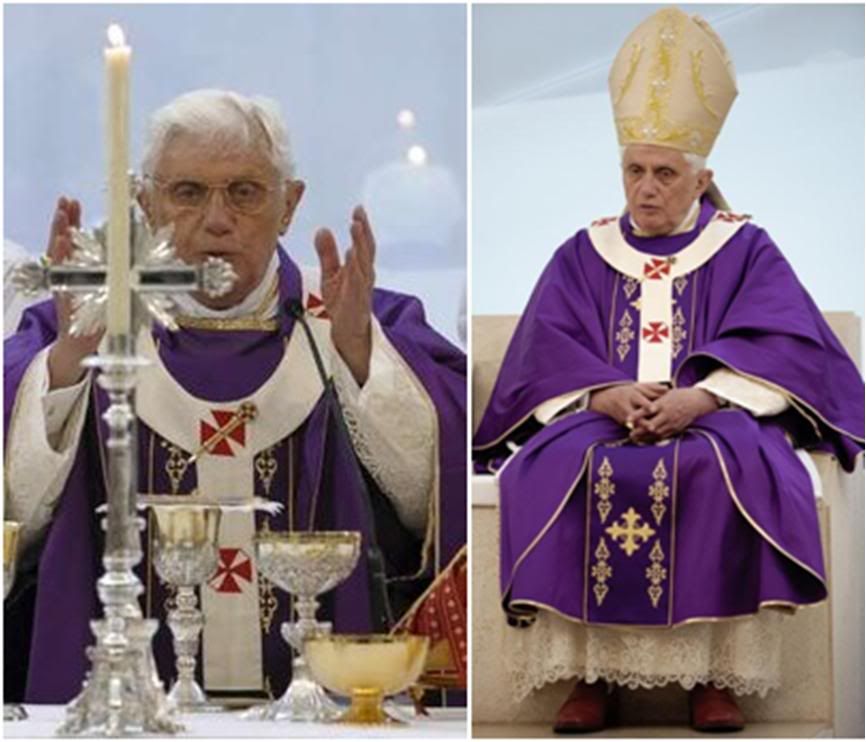
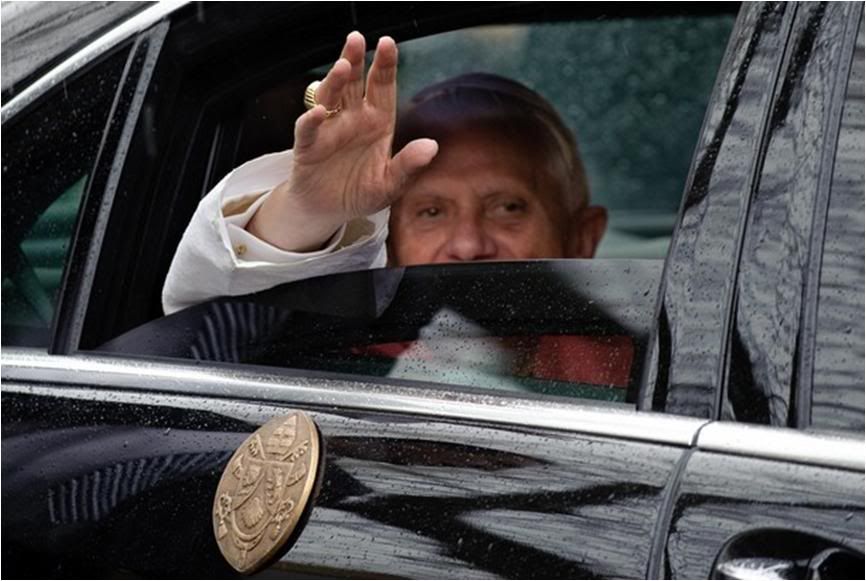
The Vatican Press Office belatedly released yesterday the texts of the Holy Father's estemporaneous remarks at Santo Volto on
Sunday to children preparing for First Communion and then to the Pastoral Council of the parish, after the Mass. It should have
reported Sunday that he did this, to begin with. One had the impression then that he went to the parish, said Mass and then
returned to the Vatican.
Translations to be posted later.
|
 31/03/2009 14:42 31/03/2009 14:42 |
|
| | | OFFLINE | | Post: 17.008 | Registrato il: 28/08/2005
| Utente Gold | |
|

March 31
St. Stephen of Mar Saba (725-796)
Nephew of St. John Damascene
Monk and Hermit (Ancient Palestine)
OR for 3/30-3/31:
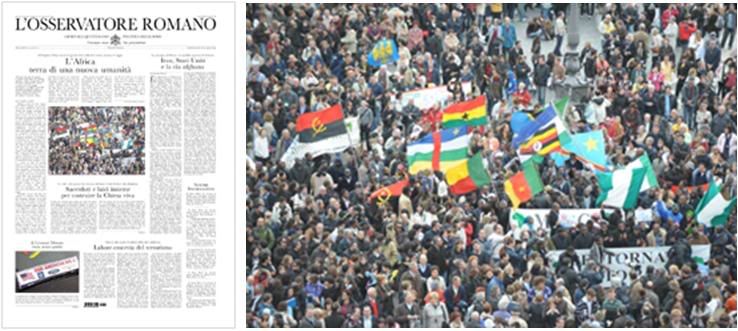
At the Sunday Angelus, the Pope recalls the great feast of faith during his African trip:
'Africa - land of a new humanity'
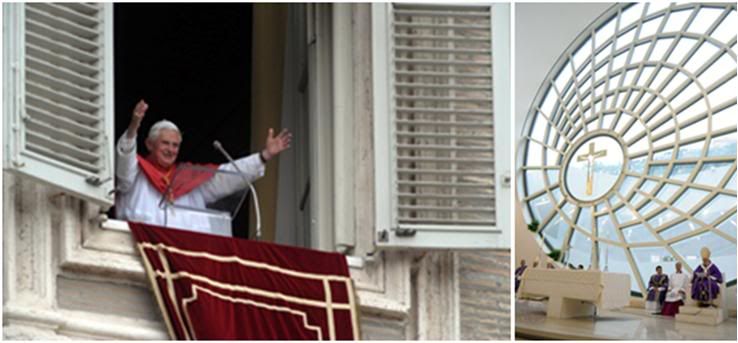
During his pastoral visit to Santo Volto in Rome's Magliana district earlier, the Pope said priests and laymen must work
together for the 'living Church'. Other Page 1 stories: Another editorial commentary hopeful that Iran may be helpful
in Afghanistan; a new terrorist attack in Lahore, Pakistan, targets a police academy; and President Obama fires the head of
General Motors.
The Holy Father has no event scheduled today (Tuesday).
The Vatican released the text of the Holy Father's message for the 46th World Day of Prayer for Vocations.
|
 31/03/2009 15:40 31/03/2009 15:40 |
|
| | | OFFLINE | | Post: 17.009 | Registrato il: 28/08/2005
| Utente Gold | |
|
 At Pope's request,
At Pope's request,
Assam Archbishop has written
2009 Good Friday meditations
by Samudra Gupta Kashyap

Mar 30, 2009
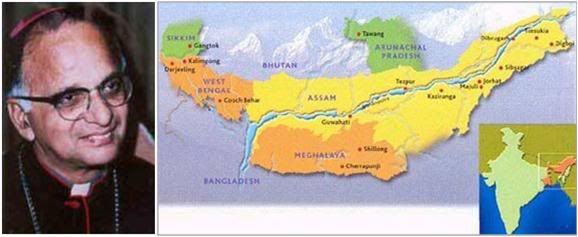 Guwahati is the capital of Assam, India's sprawling northeast state which borders with Bhutan
Guwahati is the capital of Assam, India's sprawling northeast state which borders with Bhutan
on the north and with Bangladesh on the south and Myanmar to the east.
GUWAHATI, India- On April 10, Pope Benedict XVI will be leading Good Friday meditations and prayers written by Thomas Menamparampil, the Archbishop of Guwahati [for the traditional Via Crucis at the Colosseum of Rome].
This is the first time this special task has been assigned to an Indian and the the second time Benedict XVI has assigned it to an Asia, after Cardinal Zen of Hong Kong last year.
“I was definitely surprised to get this special assignment from the Vatican. I consider it a rare honour which I want to share with all my fellow Indians, irrespective of caste, creed and religion,” Archbishop Menamparampil told The Indian Express here on Sunday.
“Being the first Indian to have been given this task, I have woven the meditations and prayers around the ahimsa mantra of Mahatma Gandhi and the ‘nishkama karma’ of the great Assamese medieval saint-reformer Sankaradeva,” the Archbishop said.
The Archbishop, who has headed the Guwahati diocese since it was created in 1992, attracted the attention of Pope Benedict when he was asked to speak on behalf of the Catholic Churches of Asia at the Synod in Rome last year.
“I think perhaps I left an impression during that presentation,” Menamparampil (72), who is currently the chairman of the Commission for Evangelization of the Federation of Bishops’ Conferences of Asia.
The meditations and prayers that the Archbishop has written will be used in a two-hour long ceremony, and have already been emailed to the Papal secretariat for translation into Italian, Spanish, French, German and other European languages.
The Via Crucis is a traditional Catholic religious exercise, during which the faithful meditate 14 scenes on Jesus's way towards his Crucifixion.
|
 31/03/2009 16:20 31/03/2009 16:20 |
|
| | | OFFLINE | | Post: 17.011 | Registrato il: 28/08/2005
| Utente Gold | |
|

 Netanyahu, peace problems
Netanyahu, peace problems
and the Pope’s visit
by Arieh Cohen

TEL AVIV, March 31 (AsiaNews) – Israel’s new government led by Prime Minister-designate Binyamin Netanyahu is expected to take office this afternoon.
For the Church, one fact in particular stands out about the new Israeli Government to be headed by Binyamin Netanyahu: The fundamentalist party Shas will once more control the Interior Ministry.
Last time a Shas member was the Interior Minister, earlier this decade, there was a complete cessation of the issuance and renewal of entry and residence permits, “visas”, to Church personnel.
It took a very great deal of heavy international pressure to induce the Ministry to start issuing such visas once more, and when it did, it was on noticeably worse terms than ever before.
Meanwhile scores of priests and men and women religious have been reduced to the status of “illegal aliens”, they can be stopped in the street by immigration police, and none could risk leaving the country, for whatever reason, for fear they might not be allowed back in.
The “visa” question, with its series of conseqyent difficulties and recurrent “crises”, has never actually been properly resolved, and now there is concern in ecclesiastical circles that it may become, once again, even more acute.
The hope is, of course, that this will not actually happen, and that instead the issue will be settled by an agreement between the Holy See and the State of Israel. Such agreement has been on the agenda of negotiators for the two sides since their 1993 Fundamental Agreement, but other issues have had to be dealt with first.
Israelis too, especially the well-educated and the more secular (the “elites”, as they are called by right-wing populists), look at the new government with some concern and not much expectation of progress on peace with Israel’s neighbours, particularly the Palestinians.
Incoming Prime Minister Netanyahu has famously refused to speak of a Palestinian State, even as a long-term goal, let alone as a subject of actual peace negotiations with the Palestinians.
This is why Israel’s largest party, Kadimah, the party of outgoing Prime Minister Olmert and outgoing Foreign Minister Tzippi Livni, has declined his invitation to join the governing coalition. Olmert and Livni have been speaking for some time now of the need to end the occupation of the Palestinian territories which began in 1967.
Surprisingly, the once-dominant and now much-reduced Labour party (only 13 out of 120 members of Parliament) has nonetheless joined Netanyahu’s coalition. The unnatural alliance between this social democratic party and the right wing parties, which form the rest of the new governing coalition, has been the subject of much comment, perplexity and even deploration.
Yet the presence of Labour’s ministers, alongside those of the extreme right and the fundamentalists, is also reassuring. The expectation is that they will be able to prevent the worst excesses that the ultra-nationalist and fundamentalist elements of the government might otherwise be capable of.
To many in Israel, it is particularly reassuring that Labour’s leader, Ehud Barak, will continue to be at the head of the powerful Defence Ministry. This is especially so since many are saying that the most crucial task of the new government will be to decide what, if anything, to do about the perceived threat from Iran.
The chief of military intelligence recently warned that Iran would be able to build an atomic weapon within a year, and all Israelis, whether left or right wing, religious or secular, are extremely anxious about this prospect.
There is widespread disgust with the insufficient determination of the West to prevent Iran’s military nuclearisation by effective sanctions.
More and more, the feeling is that Israel will now be facing the terrible choice between simply resigning itself to living henceforth in the shadow of a nuclear threat from a country that is publicly committed to the annihilation of the Jewish State – or taking direct military action to neutralise Iran’s military nuclear capacity, with unforeseeable and possibly devastating retaliatory consequences to Israel itself.
Labour party advocates of joining the government – and of ensuring General Barak’s place at the head of the Defence Ministry – have made much use of the argument that Israelis will feel much safer that way than if Netanyahu were left to his own devices.
Israelis well remember Mr. Netanyahu’s worrisome handling of national security matters when he was last the head of the government (1996-1999). It was then, for example, that he gave the order to assassinate Hamas leader Khaled Mesh’al in the streets of Amman, the capital of a friendly Arab State (Jordan), and when the assassination was botched, Mr. Netanyahu panicked at the reaction of King Hussein.
Netanyahu went out of his way to appease the King: First, he sent Amman the antidote to the poison injected by the failed agents into the body of Mr. Mesh’al, saving his life to continue to direct terrorism against Israelis; then he freed from prison the founder and ideologue of Hamas, Ahmad Yassin, who used his freedom to preside over even more terrorism against Israeli civilians.
A failure of judgement in the matter of attacking (or not attacking) Iran could of course be much costlier, and Israelis will be less nervous about such a possibility with Mr. Barak in the government as Defence Minister. Or so the argument is being made.
Mr. Netanyahu is well aware of his image-problems at home and abroad, and has been working hard to deal with them. Bringing Labour into his government is an important part of his efforts.
So is his talk of improving the daily lives of the Palestinians in the occupied territories, under the heading of “economic peace” (without political freedom). But he is certainly not helped by his choice as foreign minister, Mr. Avigdor Lieberman, the leader of a largely secular nationalist party, Israel Beiteinu, notorious for his extreme rhetoric against Israel’s Arab minority, and for aggressive statements about Egypt and its President Hosni Mubarak.
It is not certain though how long Mr. Liebermann will be able to remain at the foreign ministry. He is the subject of several police investigations on suspicion of corruption and money-laundering, and may well have to face criminal charges within weeks, or so the press reports.
Benedict XVI’s visit
The feeling in Israel is that the season of actively seeking peace, the “peace process”, which was inaugurated by the 1993 “Oslo accords” is now definitively over.
This is reinforced by the renewed prospects, on the Palestinian side, of 'reconciliation' between President Abu Mazen’s Fatah movement and the Hamas organisation, which rejects the Oslo agreements, and with them, the possibility or desirability of a definitive peace with Israel.
This is the context in which the Holy Land is awaiting the arrival, in May, of Pope Benedict XVI.
In 2000 John Paul II came into a land that was believed to be on the cusp of a definitive end to the bloody conflict between the two nations that call it home - a time of great hope and high expectations. Very little of that remains.
Yet precisely in this present time of disillusionment and anxiety, the Pope’s witness to Him Who is our Peace is surely more urgently necessary than ever.
|
 31/03/2009 17:21 31/03/2009 17:21 |
|
| | | OFFLINE | | Post: 17.012 | Registrato il: 28/08/2005
| Utente Gold | |
|
 AIDS worker says condoms
AIDS worker says condoms
are not the answer in Africa;
Catholic approach to AIDS
documented on a website
By Genevieve Pollock

KAMPALA, Uganda, MARCH 25, 2009 (Zenit.org).- The director of an African AIDS care center is supporting Benedict XVI's words about the ineffectiveness of condoms in the struggle against the spread of the disease.
Rose Busingye, who directs Meeting Point Kampala, a center in Kampala for those suffering from AIDS, and cares for about 4,000 people a day, responded to the Pope's words and the public criticism he received.
In an interview published online March 20 by Il Sussidario, Busingye said that "those who contribute to the polemics over the Pope's statements must in reality understand that the true problem in the spread of AIDS in Africa is not condoms; talking about this would be to stop at the consequences and never go to the origin of the problem."
"At the root of the spread of HIV," she explained, "there is a behavior, there is a way of being." She added, "And then let's not forget that the great emergency is to take care of the people who have already contracted the disease and for whom condoms are useless."
Offering an example of the occasional lack of comprehension of the situation in Africa, Busingye spoke about a group of journalists who had come to report on the activities of Meeting Point. Seeing the condition of the HIV-positive women, they were moved. They decided to make themselves useful and do something for the women: they gave them a small box of condoms.
Seeing this, the director reported, one of the women at the center, Jovine, looked at them and said: "My husband is dying and I have six children who will soon be orphans. What use are these boxes you are giving me?"
"What that woman and many other women like her need," Busingye affirmed, "is to have someone who looks at them and says: ‘Woman, don't cry!'"
"It is absurd," she added, "to try to respond to her need with a box of condoms, and the absurdity is in not seeing that man is love, and affectivity."
Speaking about persons who could spread the disease by having relations with others, Busingye explained: "AIDS is a problem like every other problem in life that cannot be reduced to one cause. We need to begin from the fact that there needs to be education, even in living and sexuality."
She said that in the current situation in Africa the use of condoms "can seem a bit ridiculous" since before using them one must first wash their hands, keep all dust away and store them at a certain temperature -- all things which Busingye said are rather difficult for the women she cares for to do.
Thus, she asserted, many who talk about using condoms in Africa do so without the slightest knowledge of the problem and the conditions of the continent.
Because of this, she observed, the Pope's statements caused little controversy in Africa itself.
"The Pope," Busingye emphasized, "is doing nothing else but defending and supporting precisely that which will be useful for helping these people: affirming the meaning of life and the dignity of the human being."
She continued: "Those who attack him have interests to defend, but the Pope has no such interests: he is concerned about us, and he is concerned about Africa.
"He is not the one, who is bringing mines to blow up our children, our children who become soldiers, who become amputees, without ears, without mouths, unable to swallow saliva: and what should we give them, condoms?
"When a few years ago there was genocide in Rwanda, everyone stood by and watched. Nearby there is a tiny town, which could have been protected, and no one did anything.
"My relatives were there, and they all died in an inhumane way. No one cared, and now they are coming here with condoms."
Pointing out that malaria kills more people than AIDS, Busingye asked: "Why don't they bring us aspirin and anti-malaria medicine?"
She stated that there is a method that works and that caused a reduction in the spread of AIDS in Uganda from 18% of the population to 3% and "it is to do it in a way that makes the people feel cared for." She concluded, "We see it here at Meeting Point: when the people come here, they don't want to leave."
Website on Catholic fight against AIDS
A new Web site offers videos that document the fight against AIDS from a Catholic perspective.
Video Web site: www.catholicportal.co.za/AIDS/The_Change_Is_On.htm
Metanoia Media, producer of the award-winning video "Sowing in Tears" and its follow-up, "The Change Is On," released the site last Friday to give a different perspective on the Pope's words about condoms.
"The Change Is On" features unique footage and testimonies of abstinence activists and Catholic AIDS workers in South Africa and Uganda. It documents their successes and the challenging issues they face in the fight against the pandemic.
Norman Servais, head of the South African production company, told ZENIT: "My country, as you know, is the AIDS capital of the world, so speak to us about condoms if you like and we'll tell you that they are not the answer!"
Bishop Hugh Slattery of Tzaneen, South Africa, commissioned the videos as part of a program to respond to HIV/AIDS in an authentically Catholic way.
In an interview with ZENIT, Bishop Slattery said that the aim of the second video, completed last year, is to show that "abstinence before marriage and fidelity within marriage will quickly stop the spread of AIDS."
A third production entitled "Called to Care", will deal with "caring for the sick, the dying, and the AIDS orphans," and a fourth video, due for release later this year, will show "marriage and family as the real solution to the AIDS pandemic."
The website features a very good and well-documented article summarizing what the 'science' says so far on fighting AIDS in Africa - including quotations from previous issues of Lancet, the British scientific magazine that pilloried the Pope for his statements on condoms and AIDS, in an editorial last week that is emblematic of the dishonesty nad absolute lack of scruples which liberal ideologues have in sticking to their ideological guns.
I am posting the article in THE FAITH AND SCIENCE thread.
[Modificato da TERESA BENEDETTA 31/03/2009 17:21] |
 31/03/2009 17:35 31/03/2009 17:35 |
|
| | | OFFLINE | | Post: 100 | Registrato il: 16/07/2007
| Utente Junior | |
|
Re: George Weigel's comments on the Pope and the Curia I posted a "response" to George Weigel on my own blog, so here are some excerpts for what they're worth.
"In an article stunning both for its hubris and sophistry, Weigel would have us believe that his entry into the Vatican's corridors of power is so comprehensive that his suppositions as to then-Cardinal Ratzinger's "worries" before his election will be taken as fact. This is not the first time Weigel has "pointed out" that Cardinal Ratzinger did not see himself as a "man of governance." Well, neither was John Paul II, yet Weigel has never introduced a column on the late Pontiff with that sort of qualifier. But now, with Benedict XVI, governance is a sine qua non for a Pontiff.
"Weigel piously writes about: ". . . the incapacities and incompetence of the Curia, the reform of which he [Benedict] was expected to undertake by those who elected him in 2005." Expected to do so by whom? Weigel and Neuhaus? No one else placed this item on the Pope's agenda. Given the truly epochal issues that this Holy Father is confronting: reform of the deficient Novus ordo, the reinstatement of the traditional Latin Mass, the reconciliation of the SSPX (which, of course, Weigel sees not only as unncessary, but almost evil), the elemental task of re-catechizing the 1.8 billion Catholics under his care, the fostering of ecumenical relations with the Orthodox (and, don't forget, the reconciliation of the SSPX is one of the prerequisites the Orthodox have established for their own rapprochement with Rome), concerns with the Church in Africa, the Church in China, etc., etc., etc.
"Actually, Weigel's problems with Benedict XVI have nothing to do with "governance." They have everything to do with his lifting of the excommunications of the four Lefebvrist bishops and his failed appointment of a conservative pastor to the episcopacy in the Diocese of Linz (Austria). Weigel throws in the "new" revelations about the late Fr. Maciel for good measure, but really, who was surprised? The man had already been condemned by the Holy Father in 2006 to cease his ministry. Anything else was surely gratuitous and only of prurient interest. It's not as though it was unexpected.
"But the primary problem remains the SSPX. And the unforgiveable sin of the SSPX? For Weigel it is and remains: "Archbishop Lefebvre's war, in other words, was not simply against modern liturgy - it was against modernity." And Weigel, again, disingenuously links the SSPX (all of its members) with the hoary ghosts of far-right movements past: "To those who took the trouble to look, there was no surprise here, for the ideological sensibilities of the Lefebvrist movement sprang from the same French political-cultural sources that gave rise to the anti-Dreyfusards of the late 19th century and the Petainists of the mid-20th century."
Hardly. Most SSPX members are simply those who wish to worship according to the traditional Latin Mass. And Weigel knows this. Yet he continues to lie about it.
Having smeared the SSPX, Weigel goes on to do the same to Cardinal Dario Castrillon and, God knows, the Cardinal deserves thanks, not lies, for his service to the Church."
As I said, for whatever they're worth.
|
 31/03/2009 18:33 31/03/2009 18:33 |
|
| | | OFFLINE | | Post: 17.014 | Registrato il: 28/08/2005
| Utente Gold | |
|
 Speaking of George Weigel, the Pope has done what Weigel has been advocating strongly for the Legionaries in their post-Maciel mess. I always thought it was just a matter of time, and not indifference to the problem on the part of the Vatican.
Speaking of George Weigel, the Pope has done what Weigel has been advocating strongly for the Legionaries in their post-Maciel mess. I always thought it was just a matter of time, and not indifference to the problem on the part of the Vatican.
And I thank Janice for her comments on Weigel's article about the Pope and the Vatican. I hope to address my own objections to some of Weigel's comments and conclusions as soon as I can....
Pope orders apostolic visitation
of Legionaries of Christ
By John Thavis

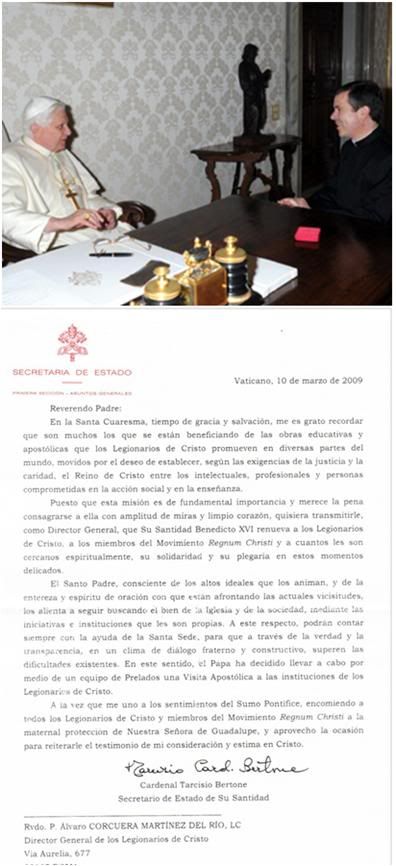 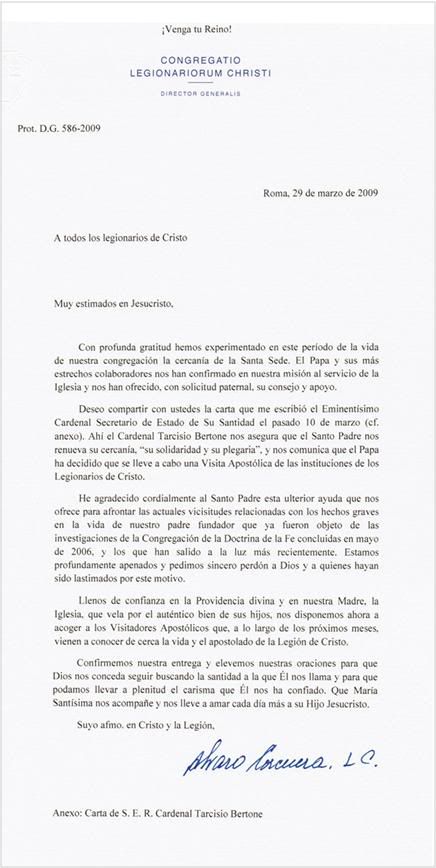 Left, the LC's Fr. Corcuera with Pope Benedict, and Cardinal Bertone's letter to Fr. Corcuera; right, Fr. Corcuera's letter to his members informing them of the visitation.
Left, the LC's Fr. Corcuera with Pope Benedict, and Cardinal Bertone's letter to Fr. Corcuera; right, Fr. Corcuera's letter to his members informing them of the visitation.
VATICAN CITY, March 31 (CNS) -- The Vatican has ordered an apostolic visitation of the institutions of the Legionaries of Christ following disclosures of sexual impropriety by the order's late founder, Father Marcial Maciel Degollado.
The announcement of the unusual investigation was posted on the Web site of the Legionaries of Christ March 31, along with the text of a letter informing the Legionaries of the Pope's decision.
The letter, written by the Vatican secretary of state, Cardinal Tarcisio Bertone, said the Pope wanted to help the Legionaries of Christ deal with its present problems with "truth and transparency." It said the visitation would be carried out by "a team of prelates," who were not identified.
Apostolic visitation is a form of internal church investigation ordered by a Pope and undertaken by his delegate or delegates. The Pope sets the jurisdiction and powers of the visitation, which usually ends with the submission of a report to the Holy See.
In February, Legionaries of Christ officials in Rome disclosed that Father Maciel had fathered a child. Sources in Rome said the order was also looking into accusations of financial irregularities by Father Maciel.
In the past, Father Maciel had been accused of sexually abusing young seminarians in the order. After investigating those allegations, the Vatican in 2006 told Father Maciel to renounce public ministry as a priest and spend the rest of his life in prayer and penitence; the Vatican did not, however, confirm that sexual abuse had occurred.
Father Maciel died Jan. 30, 2008, at the age of 87.
Cardinal Bertone's one-page letter, dated March 10, was addressed to Father Alvaro Corcuera, director general of the Legionaries and its lay association, Regnum Christi.
"The Holy Father is aware of the noble ideals that inspire you and the fortitude and prayerful spirit with which you are facing the current vicissitudes, and he encourages you to continue seeking the good of the Church and society by means of your own distinctive initiatives and institutions," the cardinal's letter said.
"In this regard, you can always count on the help of the Holy See, so that with truth and transparency, in a climate of fraternal and constructive dialogue, you will overcome the present difficulties. In this respect, the Holy Father has decided to carry out an apostolic visitation to the institutions of the Legionaries of Christ through a team of prelates," it said.
Details of the visitation were not made public in the announcement. Jim Fair, the order's U.S. spokesman, said the order knew little more than what the letter stated.
"We know they're going to be visiting. We'll cooperate and prepare. But all we know is what's on the site," Fair told Catholic News Service.
Father Corcuera said in an online statement that the visitation "is the beginning of a process in which the Legion will fully and gratefully participate." He said it would begin after Easter and would probably last several months.
"We are ready to welcome the visitators to our centers and institutions with faith and supernatural spirit, cooperating with them and facilitating their mission," he said.
In a letter to Legionaries posted on the site, Father Corcuera said he had thanked Pope Benedict "from my heart for offering us this additional help to face our present vicissitudes related to the grave facts of our founder's life."
Referring to the accusations of sexual abuse investigated in 2006 and the more recent disclosures, Father Corcuera said: "We are deeply saddened and sorry, and we sincerely ask for forgiveness from God and from those who have been hurt through this."
U.S. Legionaries Father Thomas D. Williams said the apostolic visitation was a necessary and welcome step, one that can restore confidence and credibility for the future.
"I think you absolutely need a reconfirmation by the church that (the Legionaries of Christ) is something that is good, that is a work of God, and that this has to go on, and not the contrary," said Father Williams, who teaches at the Legionaries' Pontifical Regina Apostolorum University in Rome.
He said he expected the visitation to examine to what extent a religious charism based on Father Maciel's teachings was still viable.
"I don't think anyone sees this crystal clearly right now. I think we need help in sifting through our own present and future," he said.
"Honestly, speaking for my confreres and myself, if it's not a work of God, nobody wants to be a part of it. I certainly don't. And if it is, we want to know what we're supposed to be taking from this original charism and what we're not," he said.
Father Williams said this is where the Vatican's task of discernment will be crucial.
He said that in recent weeks Father Corcuera had met with Vatican officials and then with Pope Benedict, making clear that the Legionaries wanted some kind of outside intervention to help clear up doubts.
Sources said several papal delegates would carry out the visitation, and that it would be done by geographical area: Italy and Europe, Mexico and South America, and North America. The delegates were expected to be named soon.
When the latest revelations about Father Maciel having fathered a daughter were made public in early February, Legionaries of Christ officials expressed their shock and sadness, and said the order was dealing with it "as a family."
At that time, Father Paolo Scarafoni, spokesman at the Legionaries' headquarters in Rome, spoke of a "process of purification" within the order. He made clear, however, that Father Maciel would still remain the guiding influence in the order.
"Our gratitude to him remains very strong because we have received so much that is good from him. This is something we cannot and will not deny," Father Scarafoni said.
Several prominent Catholic commentators said publicly -- and some Vatican officials said privately -- that the situation called for an outside investigation into the Legionaries of Christ, in order to ascertain the truth, determine whether officials of the order covered up Father Maciel's misconduct and judge whether Father Maciel's teachings could still inspire the order.
Several Vatican officials, who spoke on condition of anonymity, said the effectiveness of an apostolic visitation would depend in large part on cooperation by Legionaries of Christ leadership.
Father Maciel was the subject of a major canonical investigation by the Vatican from 1957 to 1959. He was suspended as the order's superior during that time, but was reinstated when the investigation ended.
[Modificato da TERESA BENEDETTA 31/03/2009 19:00] |
 31/03/2009 19:48 31/03/2009 19:48 |
|
| | | OFFLINE | | Post: 17.016 | Registrato il: 28/08/2005
| Utente Gold | |
|
 Planning begins for
Planning begins for
2012 WYD in Madrid

Rome, Italy, Mar 31, 2009 (CNA).- Pope Benedict XVI introduced his upcoming World Youth Day message, recalling “with deep gratitude” the 2008 event in Sydney and looking forward to the 2011 international event to be held in Madrid.
Marking the 24th annual World Youth Day this coming Palm Sunday, the Pope will celebrate a Mass at which possession of the World Youth Day Cross will transfer from Australian youth to Spanish youth.
Calling World Youth Day Sydney “a most memorable encounter” of spiritual renewal, he said “the joy of celebration and spiritual enthusiasm experienced during those few days was an eloquent sign of the presence of the Spirit of Christ.”
The Pope noted the World Youth Day 2009 theme is taken from 1 Tim 4:10: “We have set our hope on the living God.”
To plan World Youth Day 2011, the organizing committees of Sydney 2008 and Madrid 2011 will meet in Rome April 3 to 5 with delegates from about 70 countries.
They will be joined by about 150 people who work in youth ministry around the world and representatives from 35 international Catholic communities, association and movements.
The sessions will begin on Friday with a greeting from Cardinal Stanislaw Ryłko, President of the Pontifical Council for the Laity. Speakers will hear evaluations of Sydney 2008 with talks by Cardinal George Pell and Bishop Anthony Fisher, who will speak about the fruits of the event in Sydney and in all of Australia.
A Mass presided by Cardinal Pell will conclude the first day.
Saturday sessions will discuss World Youth Day in Madrid, with Archbishop of Madrid Cardinal Antonio Rouco Varela and Bishop César Franco Martínez.
Bishop Josef Clemens, Secretary of the Pontifical Council for the Laity, will present the Pope’s message for the 24th World Youth Day, while Cardinal Ryłko will give concluding remarks.
|
 31/03/2009 21:38 31/03/2009 21:38 |
|
| | | OFFLINE | | Post: 17.017 | Registrato il: 28/08/2005
| Utente Gold | |
|
 Don't be taken in by the apparent friendliness of the title, especially considering where it comes from. The writer is shamelessly mis-using the Pope's letter as a justification for the pro-Obama Catholic vote last November. which egregiously misses the Holy Father's assertion of the Petrine primacy - to uphold the faith and Catholic doctrine as it has come down to us through the ages, not as pick-and-choose Catholic liberals today think it should be.
Don't be taken in by the apparent friendliness of the title, especially considering where it comes from. The writer is shamelessly mis-using the Pope's letter as a justification for the pro-Obama Catholic vote last November. which egregiously misses the Holy Father's assertion of the Petrine primacy - to uphold the faith and Catholic doctrine as it has come down to us through the ages, not as pick-and-choose Catholic liberals today think it should be.
![[SM=g27812]](https://im0.freeforumzone.it/up/0/12/5757084.gif) ![[SM=g27812]](https://im0.freeforumzone.it/up/0/12/5757084.gif) ![[SM=g27812]](https://im0.freeforumzone.it/up/0/12/5757084.gif) ![[SM=g27812]](https://im0.freeforumzone.it/up/0/12/5757084.gif) ![[SM=g27812]](https://im0.freeforumzone.it/up/0/12/5757084.gif) ![[SM=g27812]](https://im0.freeforumzone.it/up/0/12/5757084.gif) ![[SM=g27812]](https://im0.freeforumzone.it/up/0/12/5757084.gif) ![[SM=g27812]](https://im0.freeforumzone.it/up/0/12/5757084.gif) ![[SM=g27812]](https://im0.freeforumzone.it/up/0/12/5757084.gif) ![[SM=g27812]](https://im0.freeforumzone.it/up/0/12/5757084.gif) Civility and respect should be our aim:
Civility and respect should be our aim:
Give Benedict the benefit of the doubt
By Nicholas P. Cafardi

Mar. 30, 2009
It was hard not to be moved by Pope Benedict XVI's recent cri de coeur on the Catholic world's reaction to his remission of the excommunication of the Holocaust-denying Bishop Richard Williamson.
"I was saddened by the fact that even Catholics who, after all, might have had a better knowledge of the situation, thought they had to attack me with open hostility," the Holy Father wrote in a letter to all the bishops in the world.
A lot of the criticism of the Pope's action came from the United States: bishops, priests and laity alike [and the National Catholic Reporter]. Welcome to the politics of the American church, Holy Father.
Yet we would be missing something much deeper were we not to pay attention to the Holy Father's point: Why would his fellow Catholics presume his bad faith? Why would they, who know him better, not give him the benefit of the doubt?
As the vitriol of the last presidential campaign proves, we in the American Church have forgotten how to give our fellow Catholics the benefit of the doubt. Those Catholics who supported the Democratic ticket for what they honestly believed were social-justice concerns consistent with Catholic teaching were pilloried by a vocal portion of the Catholic pro-life movement for deserting the cause, as if there was only one way to be pro-life.
{There is only one way to be pro-life, and that is to be for it under all circumstances, not just when you say so. You can't be 'pro-life' only for 'social' causes', but anti-life when it comes to favoring the liberal 'pleasure-above-all' dictum of sexual irresponsibility, and then rationalizing the illogical by telling yourself that an unborn child is not a person, after all.]
A few weeks ago, a U.S. senator, a convert to Catholicism, sponsored a letter distributed by a supposedly Catholic think tank claiming that a number of his fellow Catholic senators -- whom the letter named -- could no longer be considered good Catholics because of their votes on issues on which the senator (or whoever the author of the letter was) claimed that there was only one orthodox Catholic way to vote. [Did Cafardi even review his text? Voting pro-abortion, or for pro-abortion politicians, cannot and could never be be 'the orthodox Catholic way to vote!]
There is even a Web site where American Catholics can sign a petition to the U.S. bishops to withhold the Eucharist from "prominent Catholics in public life" who don't vote on political issues as these Catholics think they should.
We all need to take a lesson from the Holy Father. Yes, one could malevolently interpret his lifting of Williamson's excommunication as support for the bishop's Holocaust denial.
Or one could give the Holy Father the benefit of the doubt and think he had perfectly valid ecclesiastical reasons -- like ending a bothersome schism -- for what he did.
[But how can any faithful Catholic doubt that the Pope does not have any 'perfectly valid ecclesiastical' reason to end a schism? It's part of his job description - as is preaching Catholic doctrine to dissident Catholics who think they can and should dictate what the Church teaches.]
It is not moral relativism to say that the complex world of church schisms or American politics is not a world of either/or but a world of both/and. We live in a world of shadings and nuances. And when folks don't act exactly the way we are politically or ecclesially disposed to act ourselves -- even when it is the Holy Father, or especially when it is the Holy Father -- it is almost always a good idea, one might even say a Christian idea, not to presume the worst and jump to a personal attack on the person's motives and character.
[It has nothing to do with personal attack - it is a simple general judgment based on obvious and inescapable fact of religion that in the Catholic Church, we the faithful do not tell the Church what it must teach. Religious faith is also a discipline - your belief has to be all or nothing. And yes, dissenting Catholics are moral relativists who cannot accept the absolute morality of Catholic teaching.
If you question part of the doctrine - but do not have the courage to leave the Church and seek a more congenial religion - then keep your questions to yourself and your confessor, to your private sphere. Don't set yourself up as public policeman/prosecutor/judge/jury/executioner for an institution that has survived 2000 years, and is not a purely human institution but one established by Christ as his mystical Body in the world.]
As Pope Benedict himself said to the priests of Rome, "Catholicism has always been considered the religion of the great 'et et' ['both/and']: not of great forms of exclusivism but of synthesis."
[That is so disingenouos and a blatant misuse of the Pope's words! He obviously does not mean that the Church has to assimilate even beliefs and practices that are contrary to her teachings! The FSSPX, on the other hand, has upheld all its teachings - and if it has questions about the open-ended interpretation of Vatican-II, it has also stated quite clearly - and one can also see this by what they say and disseminate on their various sites - that they accept the Magisterium of Benedict XVI, which obviously includes Vatican-II.]
Fundamentalism, political or theological, has no place in the Catholic Church, and when we use such standards to judge one another, we are simply being self-destructive.
[Since when is opposition to contraception, abortion, gay marriage, women priests, etc. 'fundamentalism' in the sense that Cafardi means? - which is like when one uses that term to refer to Islamic extremists. But yes, all Catholics must be 'fundamentalist' in the way Benedict XVI teaches - we must accept and believe the fundamentals of the faith as it has come down to us from apostolic times.]
Or, as Pope Benedict concludes his letter to the world's bishops, quoting Galatians: "For the whole law is fulfilled in one word: 'You shall love your neighbor as yourself.' But if you bite and devour one another, take heed that you are not consumed by one another."
[Who, pray, has been 'biting and devouring' in this whole progressivist-vs-traditional post-Conciliar 'war'? Most of the aggression has come from Cafardi and his fellow NCR types. There may be equally aggressive ultra-traditionalists but they have never dominated media and public opinion as the progressivists did and still manage to do.
What Cafardi is really saying is that only he and his kind should be allowed to 'bite and devour'. You'd think they have never done their part to 'bite and devour' Joseph Ratzinger-Benedict XVI, that they were not part of those he meant by 'Catholics who should know better'.
]
Nicholas P. Cafardi is a civil and canon lawyer, and a professor and former dean at Duquesne University School of Law in Pittsburgh.
|
|
|
|
|